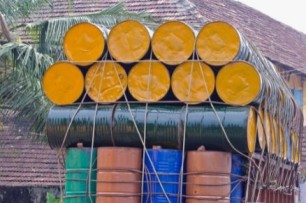General Insurance Blogs, Articles & Updates by - Magma HDI
Have us call you
- RENEW YOUR POLICY
- BUY NEW POLICY

Benefits of getting car insurance
An increasing number of vehicles on the road, along with the insufficient infrastructure to support them, is leading to a rise in the number of accidents and fatalities. There were over 4.61 lakh road accidents just in 2018 and these are only the ones that were reported. Car insurance becomes very important at times like these. It saves you from paying massive amounts to repair the damages to your car.
Still not convinced? Here are some of the benefits of buying a car insurance policy.
Protects your finances in case of an accident
If an accident happens, your Car Insurance can protect your finances by covering the repair expenses. If there's a third party involved and you are liable to pay them for any property damage or medical help, you can rest assured as your insurance can take care of that as well. In fact, it doesn't even have to be a road accident, as it also covers claims resulting from man-made and natural calamities like storms, floods, theft, vandalism, or riots.
Offers coverage for theft
You spend so much time, effort and money on buying a new car. The last thing you'd want is for someone to steal it. As sad as that is, it's not impossible. Which is why a good motor insurance policy also covers you against it. If your car is stolen, your policy will reimburse you the cost of your car. It can also cover the cost of repairs resulting from the break-in attempt.
Avail cashless services
When you buy motor insurance, you are entitled to getting cashless services at your insurance provider's network garages. This essentially means that you can get covered services without having to pay a single rupee. Say you damage your vehicle, all you need to do is go to your nearest network garage, show proof of your insurance and get the repairs done.
Covers personal accident liabilities
Motor insurance policies also cover disability or death leading from a car accident. So your motor insurance covers both you and your vehicle. For a person other than the owner/driver, you can separately buy a personal accident cover. The cost of your cover will depend on the extent of coverage you choose
Provides customization with riders
Riders or add-ons offer additional coverage on your basic motor insurance plan after payment of a nominal fee. The standard rider options are:
- Zero depreciation add-on where your insurer bears the cost of repairs without considering the depreciated value of your car. This feature helps you maintain the value of your car despite wear and tear.
- Road-side assistance add-on helps you out on the spot whenever you encounter any issues such as a flat tire, dead battery etc. You may even get additional road-side assistance with Magma HDI.
- Engine protection add-on covers damages to the engine due to malfunction, water damage or leakage of lubricants.
- Loss of personal belongings add-on is protection against accidents or burglaries where you end up losing valuables such as your phone or laptop. Your insurance provider helps you out with this cover by reimbursing you for your loss.
So, having the right car insurance is like always having someone watching your back when you’re driving your vehicle. It ensures the safety of your car, passengers, and pedestrians.

The Evolution of Health Insurance
Health insurance is a necessity in today's age, but the easy accessibility and wide range we enjoy today weren't always there in the past. It's safe to say that health insurance policies in India have forged their path over the years. But do you know how? Here's where we can help you with facts about the insurance you can't do without these days.
How did it begin?
Since the independence of India in 1947, our healthcare system revolved around government schemes and plans. The life insurance system that dates back to 1818 was the first of its kind for Indians. The popularity of life insurance in India was attributed to the low life expectancy and closely-knit family systems.
However, with liberalization in the early 1990s, healthcare delivery improved with an increase in disposable income. As a result, life expectancy increased to 65 years by the year 2011. The nineties also saw an influx of other things such as lifestyle diseases and consistently rising medical costs which made health insurance the invaluable commodity that it is today.
Crucial developments and current scenario
The IRDAI or Insurance Regulatory and Development Authority of India's legislation of the year 2001 is a vital milestone for Health Insurance In India. It opened new avenues for investment by private players in the industry. Over the years, the advancement of treatments and cashless claims enhanced the popularity of health insurance policies among buyers.
Despite all these developments, the sector is largely dominated by government-owned enterprises and its subsidiaries that account for nearly 60% of the total market share. Private health insurers are increasing their base and outreach mainly in the tier-1 and tier-2 cities with features like cashless payments and in-patient reimbursements. A major goal of health insurance is reaching all parts of the country.
Challenges for health insurance
Over the past two decades, the health insurance providers in India are consistently struggling to provide accessible and affordable care to the masses. It has many challenges that need critical analysis and solutions. The main challenges in this sector are:
- Lack of awareness about the importance of health insurance. For instance, people don't realise how much difference a comprehensive health insurance can make at the time of an emergency.
- Gap between affordability and accessibility because the rural population relies on government-based facilities as the private sector does not cater to their basic needs.
- Differences in service quality due to multiple levels of care delivery system. This increases the overall costs and causes quality concerns.
- Ignorance on the part of consumers which makes them avoid getting insurance until the last minute.
- No strong regulatory framework to standardize the healthcare delivery system.
These are only some of the glaring issues we face in our country. Both consumers and insurance providers need to do their part so as to bridge the gap which will allow everyone to get healthcare in an easy and fair manner.
Future trends in health insurance
With the internet and other media platforms, more and more customers are beginning to understand the importance of health insurance. As a result, the number of policies sold has doubled in the last ten years.
The millennials have become a key focus for the major players due to their increasing awareness and their numbers in the workforce. Incentives such as tax benefits also encourage the working class to invest in health insurance plans.
In a nutshell, a focused approach of evolving cost, quality, and access show a promising future for healthcare insurance in India.
Standardization of adequate health care provisions is still an aspiration which must be realized over the years.
To get the best of Health Insurance Policies In India, Check out Magma HDI.

The truth about theft insurance
With gated communities and technologically superior security systems, theft has significantly reduced in our country; however, as with any other type of risk – it can only be minimised, not eliminated. Its consequences also are not limited to your financial losses but also includes trips to the police station, affidavits, reams of paperwork, fear and trauma, leaving you depleted in all senses of the word.
This is where theft insurance comes in. Getting financial protection for your loss sure does take a load off your mind if an unfortunate incident does take place. Read on to find out more about theft insurance and how it works.
Theft insurance is essentially a plan that will cover you for any losses arising from burglary, robbery, etc. Not only does the policy cover you for the loss of valuables but also for any damage to premises, furniture, fixtures and physical assault during the attempt. Insurance providers such as Magma HDI also cover temporary security expenses so that you and your loved ones can feel safe again. Thus, you can rest assured that your insurance plan will take care of all your needs.
Important points to remember
- It is imperative to carefully go through your policy documents to understand the coverage, terms and conditions, exclusions etc. provided to you. For example, when looking to travel extensively, some insurance companies will ask you to intimate them if the premises will remain unattended for an extended period of time.
- The claims process for any insurance policy holds immense significance for all of us. Under a theft insurance policy though, theft and burglary are two separate events while filing your claim. While theft is a non-violent and unforceful entry into your premises, a burglary involves a forceful or violent attempt by breaking in/ tampering in order to rob you. Usually, you would need a separate cover for either peril, but nowadays insurance companies in India provide coverage for both through a single policy.
Ideal coverage
A common dilemma while opting for a Theft Insurance Policy is determining how much coverage you need. An important point to remember while making this decision is that your coverage will be limited to the sum assured by you. So, if you have assets worth 20 lakh in your home and have a coverage of 5 lakh, the insurance will only cover the loss till the extent of the sum assured. To avoid getting inadequate coverage, it is important to assess the worth of all your insurable assets and look for an insurance plan that gives you coverage based on your needs.
Exclusions
There will inevitably be a few exclusions to your cover. For example, some theft insurance policies do not cover cash or cash equivalents, stocks and share certificates, agreements and title deeds. Similarly, you may need to purchase a rider to cover for precious metals such as gold, silver, etc., precious stones such as diamonds, and other art and antiquities. Thefts committed by family members, house help or employees, loss arising due to riots, terrorism and war are excluded as well.
A final tip for you is staying on top of your policy. Reassessing your coverage needs periodically, especially when adding new inventory, expensive machinery or valuables will ensure that your financial risk is minimised in case of any unforeseen incidents.

Everything you need to know about marine insurance
In spite of the advancement in road, air and rail transportation, the sea route remains the most preferred mode of freight for international trade purposes. The sheer magnitude of cargo at stake is enough to make anyone think twice about what measures you can take to secure your shipments.
This is where marine insurance comes in. It gives you the peace of mind you need with its extensive coverage.
What is marine insurance?
Marine insurance protects you in case of damage/ loss of cargo, ships and vessels; when a property is acquired, transferred or held in possession between the starting point up until the destination.
Why buying marine insurance is a good idea?
Consider an example. Suppose you are a seller and you put your goods on a ship. Due to bad weather or a storm at sea, there is damage to valuable goods to an extent whereby the customer at the destination refuses to accept the final goods. For no fault of yours and due to unavoidable circumstances, you would suffer a monetary loss that could even go in crores!
Thus, it is essential to buy marine insurance to get coverage for the following:
- 1. Export or import shipments.
- 2. Goods being transported using sea, rail, road, post or air.
- 3. Goods being carried via coastal vessels plying between ports located within the country.
- 4. Goods that are transported via the vessels plying along rivers.
Other Advantages
Here are some other advantages that you are entitled to with your marine insurance-
- 1. The insured obtains additional advantage of global claim survey and settlement.
- 2. The cover accommodates diverse situations including property damaged either/or onshore or offshore, casualty at sea, marine liability, hull damages and other needs of the insured.
- 3. There is an option to extend the plan to include protection against extraordinary circumstances like perils at sea, strikes, pirate hijack etc.with the help of add-on covers.
- 4. Marine insurers would be willing to provide tailor-made policies as per specific requirements and budget of the insured such as Magma HDI's Marine Insurance Policy.
Exclusions
Marine insurance covers many situations, but the following are the exclusions:
- 1. Normal wear and tear or leakage.
- 2. Goods getting damaged during transportation owing to improper packaging.
- 3. Any damages due to delays.
- 4. Any damages caused intentionally to incur a loss and make a subsequent claim.
- 5. Any damages due to a civil disturbance, war, strikes, riot etc.
- 6. Any damages due to a financial difficulty such as bankruptcy or financial default of the owner of the transport vessel.
It is always a great idea to assess your unique needs before going out to purchase any insurance. However, getting a plan that is comprehensive in nature can never lead you wrong.

Affordable Health Insurance is a reality
There is a famous saying "health is wealth," and it is indeed true in today's context. With people getting busy with their hectic life, there is a growing trend of unhealthy eating habits and sedentary lifestyle. In the pursuit of money, health has been left far behind. Now, one cannot give up on his/her career, but they certainly can opt for a health insurance policy that offers protection against unexpected medical emergencies. Health insurance is ignored by people for many reasons, and this has led to India's problem of "under-insurance." Herein, people opt for an inadequate amount or rather do not opt for any health insurance thinking that no ailment can affect them. Another reason given by people is that the premium for health insurance is very high, and they cannot afford it.
Affordable Health Insurance – is it a reality?
The excuse that health insurance is expensive is not true. Affordable health insurance is a reality and has benefitted many families for the past few years. With the rapid integration of technology in the insurance sector, many insurance companies are now offering their services online. You can easily purchase or renew health insurance online in a few clicks. As most companies have taken their operations online, the cost of availing and renewing health insurance has gone down substantially.
If you are still unsure about the affordability of health insurance plans, here are some tips to help you select an affordable health insurance policy for yourself as well as your family:
Understand your requirements: First of all, you need to understand yours and your family's health insurance requirements. Consider factors like the number of members, their age, existing conditions, family health history etc. This will help you understand the extent of coverage that you require.
- Start early: Health insurance premium against a new policy for a young person of 25 years will be much lower than for a mature person of around 50 years of age. This is due to the risk involved for the insurer. So, you must subscribe to a. personal accident insurance online as soon as you start work, to enjoy the lowest premiums. Then gradually, keep on enhancing the coverage of your policy as your income rises.
- Do some research: Several online insurance marketplaces have come-up, which allows you to compare policies from different insurers easily. As these marketplaces eliminate the agent from the transaction, the cost of the policy goes down substantially. By comparing the coverage of different policies, you can reduce your premium payments significantly.
- Opt for a floater policy: You can opt for a floater policy wherein one policy covers your entire family, including dependants. Instead of paying separate premiums, you only need to pay a single premium and will get insurance coverage for the whole family.
- Tax Benefits: You can claim an income tax deduction of up to Rs. 25,000 for the health insurance premiums paid in a financial year for yourself and your family. If you pay a health insurance premium of your parents, you can claim an additional tax deduction. Thereby, you can save substantially on your income tax liabilities.
- Online renewal: When you renew health insurance online, through the insurance company's website or any online marketplace, you can enjoy lower premiums. As the companies do not need to pay any commissions, you can save a significant amount of money by opting to renew health insurance online.
The benefits offered by a health insurance plan are too good to be ignored just because you think health insurance is unaffordable. Do some research, and you will see that health insurance is indeed affordable and is rather a necessity for your family.

5 Reasons why you should have an Individual Personal Accident Policy
There is a false sense of security in most individuals, where one feels like they can never meet with an accident, but like as the saying goes, it is better to be safe than sorry. No one wants to experience an unfortunate incident, but whether due to your mistake or someone else’s mistake, you can meet with an accident anywhere and anytime. Although no one can control such situations, you can certainly prepare for it.
With the number of vehicles steadily rising, across the country, the possibility of a car-related tragedy also increases. In situations as such, you could be staring at high costing expenses on hospital bills, as well as a loss of income due to being bed-ridden. Having an individual accident policy will take care of all these emergency expenses.
What is a personal accident policy?
Personal accident policy offers insurance cover to policyholders in case of an accident or injury caused due to any given reason. The insurance company will reimburse the policyholder in cases of serious injuries, permanent disability, or death, accidentally caused, according to the terms and conditions of the policy.
You can buy your personal accident insurance online as well as offline, as per your preference.
Why should you have a personal accident policy?
There are various benefits offered by a personal accident policy, which make it necessary for you to have one, such as:
- Reimbursement in case of disability: If you face an accident and suffer a temporary or permanent disability, you can claim compensation from the insurance company. The company will assess the nature of the injury or disability and give you compensation as per the guidelines of the policy. This will support you and your family financially during such tough times.
- Hospitalisation and other expenses are taken care of: All hospital bills and cost of treatment are covered under the policy. In case of death, the insurance company will pay for the repatriation, funeral, and ambulance charges.
- Reimbursement for modifications: If the accident has left you wheelchair-bound, then you need to modify your home or vehicle to suit your needs. Any expenses incurred for such adjustments necessitated by the mishap can be reimbursed from the insurance company.
- Payment of death benefit: If the mishap results in unfortunate death, then the insurance company will pay the death benefit amount, as per the policy terms and conditions, to your family members, offering them financial support.
- Transportation of family: If you are admitted to a hospital after an accident and the hospital is more than 150 km away from your home, the insurance company will pay for the transportation costs incurred by your family.
To avail such benefits in the time of emergency having personal accident insurance online or offline is imperative for the financial well-being of your family.

Benefits of daily cycling
In modern times, various lifestyle-related ailments such as diabetes, hypertension, depression, obesity, etc. have started affecting people from a young age. Due to 24*7 use of smartphones, unhealthy eating habits, and a lack of physical exercise, more and more people are getting affected by these lifestyle diseases. While you may have thebest health insurance policy in india , you need to engage in regular physical exercise to stay fit and healthy. There are various forms of exercises that you can indulge in, but the benefits of daily cycling are too good to be ignored.
Cycling is regarded as one of the best ways to stay away from lifestyle conditions and reduce the risks associated with a sedentary lifestyle. Additionally, it is one of the cheapest, enjoyable, and useful physical workouts. If you are still unsure about the benefits of daily cycling, here are the health benefits of regular cycling:
- Fewer chances of injury: Cycling hardly causes any strain and can be enjoyed by people of all age groups. There are minimum chances of injuries while cycling, as compared to other forms of exercise.
- Time-efficient: Cycling is one of the most time-efficient exercises you can engage in. Not only does it offer you several health benefits, but it can also be used as a means of transport. It will help you get rid of your inactive lifestyle and save your travelling expenses as well.
- Easy to learn: Even if you do not know how to cycle, it will only take you a few hours to get the hang of it. There is no need for strong physical skills, and it does not need a lot of practice to learn it; it is one of the easiest exercises to learn. You can start from low-intensity mode and increase as you get used to it.
- Boosts your stamina: Cycling engages several muscles in your body and thereby helps boost your stamina over time. It also improves your lower body strength as well as aerobic fitness.
- Reduces stress levels: Going for cycling in the morning helps you come closer to nature. The fresh morning air acts as stress-buster and enables you to feel relaxed and rejuvenated.
- Freedom from obesity: Cycling is one of the most useful workouts to help you get rid of excess fat from your body. It boosts the metabolism rate and helps build muscles. Within a few weeks of cycling, you would start witnessing a reduction in your weight; and would feel active and fit.
- Reduces the risk of specific cancers: Research has proven that regular cycling reduces the risk of various types of cancers such as breast cancer, colon cancer, and bowel cancer.
With various health benefits on offer, cycling is undoubtedly one of the most useful forms of physical exercises available. To enjoy good health and freedom from health-related stress, it is essential that you eat a healthy diet, engage in regular physical activity, and subscribe to the best health insurance policy in India.

Five things you should know about personal accident insurance
Financial security is a priority for any family and having health insurance is one of the first steps towards keeping your family secure during health emergencies. But, what about other emergencies which are beyond the coverage of any health insurance policy?
Zeenat, a single parent of a 6-year-old daughter, takes as many precautions for her daughter's well being as she can. She has saved enough for daughter’s future in forms of fixed deposits and mutual funds. She has also taken health insurance for both to secure against any health emergencies. The planning seems perfect for a family of two people except for a loophole, not having an accident cover that could put all in vain if something goes wrong.
According to a report by the TOI, In India alone, about 1.49 lakh people lost their lives by road accidents in 2018. Personal accident insurance is an answer to such life-threatening situations, as a family gets shattered just by the news of an accident, let alone the future consequences that might bring substantial financial burden. However, before you go for a personal accident insurance plan, here are some things that you must know:
1. What is personal accident insurance?
A personal accident insurance policy gives you a cover against accidents. It could be a road accident, a sudden fall, or any situation that leads to a disability or even death. Having personal accident insurance will save your expenses during such an emergency, and the insured amount would also take care of the loss of income that occurred during this period.
2. What does a personal accident insurance plan offer you?
Personal accident insurance generally envelops accidental death, permanent total disablement, permanent partial disablement and temporary total disablement.
But one thing that worries a person is what if the medical expense goes beyond what his policy can cover? With Magma HDI's Individual Accident Policy cover, a person can opt for Medical Expense Extension and Hospital Confinement Allowance.
3. What does the personal accident policy not cover?
It does not cover natural death due to drug addiction or alcoholism, adventurous sport, a breach of law with criminal intent, suicide-attempt, pregnancy, war, civil war, invasion, act of foreign enemies, revolution, insurrection or mutiny, pregnancy, participation in any naval, military or air force operations, curative treatments or interventions.
4. What is the need for personal accident insurance?
The need arises from the gap that health insurance and a life insurance policy will not cover. While, health insurance mainly covers the severe ailments and any other health emergencies, a life insurance policy pays compensation only in case of death. A personal accident insurance policy, on the other, is equally important for your insurance portfolio, which covers the policyholder in case of hospitalization or even in case of death due to an accident.
5. What is the ideal personal accident insurance?
The ideal personal accident insurance depends on individual exposure to situations and risks. For example, if your profession requires extensive travel, opt a plan that covers your international travel.
Go for the best personal accident insurance plan that ensures the maximum coverage and financial stability in the event of any accident.

Easy ways to choose affordable health insurance
Medical facilities in India have now achieved the status of being “world-class,” allowing the people of country with access to best treatment within the country. This improvement in facilities has come along with a substantial increase in medical expenses. As a result, purchasing health insurance in India has become a necessity because covering medical expenses from your own pocket has become virtually impossible. In fact, if your parents are in their older years, you must opt for health insurance in india for parents to allow them access to best-in-class treatment for their ailments, without jeopardising their financial future. Due to the efforts of the Government and leading insurance companies, awareness regarding health insurance has improved significantly in India.
With multiple insurance companies operating in India and offering various health insurance plans, it is certainly possible that you are confused regarding the best option. If you are unsure regarding the best policy for you, then read on to know about the easy ways to choose affordable health insurance:
- Understand your requirement: Firstly, understand the extent of coverage you require. This will depend on numerous factors like your age, family size, premium affordability, and future health requirements. Moreover, if your parents do not have a health cover, then you must get health insurance in India for parents. Also, there are various additional covers available, which can come handy in case of certain conditions.
- Coverage for ailments: Nowadays, there are several health insurance policies that offer coverage for specific critical illnesses. You need to ascertain the type of diseases you wish to cover under your health insurance policy before opting for an option.
- Coverage for pre-existing ailments: Different health insurance policies offer different waiting period for pre-existing illnesses. You need to identify a plan that has a minimum waiting period. This will save you from unexpected hospitalisation expenses in case you need treatment for the ailment before the completion of the waiting period.
- Claim-settlement ratio: This ratio signifies the percentage of claims that the insurer settles out of every 100 claims received. You need to opt for an insurer with the highest claim settlement ratio so that your claim would not be rejected for any frivolous reason.
- Cashless hospitalisation: Different insurance companies have agreements with different TPAs (Third Party Administrators). These different TPAs have different hospitals on their panel. You should opt for an insurer who offers maximum hospitals for cashless treatment. Moreover, the hospitals near your home should be covered under the panel of the TPA, as it would convenient for you in the need of emergency.
- Compare the premiums: Last but not the least, make it a point to compare the premiums of different insurance companies. For the same extent of coverage, different insurance companies charge different premiums. Nevertheless, there are various plans that offer cheaper premium but also have reduced coverage. There are various online platforms where you can easily compare various health insurance plans, their coverage, and other essential parameters.
The importance of choosing the right health insurance plan cannot be neglected as it is directly associated with your health. So, never rush but always make an informed decision after carefully comparing various crucial factors affecting your health plan.

How have basic Ayurveda tips transformed our lives for the better
Ayurveda is not just about natural herbs and spices and consuming them raw. It is more about how you can boost your immune system and increase the efficiency of your organs to energise your bodily functions. Unlike the traditional methods of human living, Ayurveda emphasises ramping up your everyday lifestyle by prioritising your mental and physical health remain in check. It helps you in achieving the true meaning of “health is wealth” without distinguishing between the value of the mind and the body.
Are you looking for more information on how Ayurveda would help you change your lifestyle for the better? This blog will help you gain a positive outlook on this old Hindu system incorporated into the Atharva Vedas, the last of the four main Vedas in history. So, let’s get started.
1. Early to rise:
We all have read “early to bed and early to rise makes a man healthy, wealthy and wise”. The same has been repeatedly told to us by our parents and every adult you might have encountered. Well, Ayurveda reaffirms the truth in this statement. It states that the morning is the freshest and the purest time slot of the entire day, which can be super productive if appropriately utilised.
Waking up around 4:30 AM-5:00 AM daily will help you achieve positivity and a more robust and healthier outlook on life. It will also regulate your bodily functions and give you a headstart to the day compared to others who groggily wake up late.
2. Pay attention to your eating habits:
Ayurveda instructs that you practice a healthy habit of eating and calls it “ayurvedic eating,” which involves the importance of consuming natural and green vegetables and fruits.
It mentions the negative impacts of junk food and how essential it is to avoid such oily items loaded with unwanted carbohydrates and fats, which are difficult to break down and get deposited in your body. This leads to several major diseases which can potentially endanger your health in the long run.
3. A morning refreshing drink goes a long way:
We all have heard that consuming water with a few drops of honey in the morning helps rejuvenate your body as you begin your day. Add a teaspoon of quality honey in half to one glass of water and consume it as you wake up. This helps eliminate all the toxins in your body, and this mixture also helps kill several types of harmful bacteria.
4. Pay attention to your sleep:
After an entire day of work and other activities, your body and brain get exhausted. And to re-energise and detoxify all the tiredness, you need to sleep a good eight hours. Sleeping properly boosts your health and strengthens your immune system. It also helps in proper blood circulation, thus providing you with sufficient energy to function throughout the next day and take on the challenges the day presents you with.
Other Ayurvedic practices include walking. It is considered one of the best exercises one can do at their own pace without exhausting themselves for hours at the gym and taking additional supplements. Creating a routine and sticking to it has been given a lot of importance in Ayurveda. Your body functions better as it slowly gets habituated, thus providing a structure to your day instead of just letting you wonder how to go about processing and working on multiple things.
We are all aware of how unpredictable life can be as we face the pandemic and extreme situations. To battle the uncertainties of life, we must have some assurance that does not land us in financial stress. It would be best to get general insurance to combat health issues and not lose money on your assets. Explore the options provided by the best General Insurance companies in India, and buy a reliable health insurance plan. This will give you the confidence to lead a healthy life where health expenses don’t feel a burden!
Click HERE to learn more about the insurance benefits of various insurance benefits of various general insurance companies in India.
Disclaimer: The information provided above is for illustrative purposes only. To get more details, please refer to policy wordings and prospectus before purchasing a policy.

Here is a list of medications you must carry on a trip
With today's working culture and daily hustle, travel is one way to unwind and relieve stress. Considering the various travel destinations and experiences, it is no surprise that people want to leave the comfort of their homes at least once a year to explore exotic places. However, you must have faced instances where you have fallen prey to common ailments on a trip, ruining your whole stay while your loved ones had the time of their lives.
It is very taxing to hunt for medicines in a place where you don't know the language and are a stranger. So, it is wise to make a medical kit where you keep medications for the most common ailments. This blog gives you a list of medicines you must consider carrying on a trip.
1. Antacid:
With a new, exotic cuisine to try, no one plans to walk around the trip with a stomach burn from acidity. So, an antacid is extremely important to carry on a trip to remain tension-free about all the new food you will savour.
2. Diarrhoea medicine:
Travellers often visit new and exciting places in remote areas to absorb fresh perspectives and quaint experiences. However, they face health issues while adapting to the food and water in these unfamiliar regions, creating an uncomfortable situation with diarrhoea. Carry anti-diarrhoea medicine in all of your travels to get rid of this problem.
3. Fever medication:
No tourist wants to lie in bed with a headache and fever instead of exploring a place's attractions, cultures, and heritage. Take a paracetamol pill and get going with your day as a quick fix to a jet lag-induced headache or joint pain.
4. Cough syrup:
Cough syrups are essential while going on a trip. No one likes a scratchy and congested throat while moving around the city, asking for directions, or ordering food. It's best to take one that does not make you sleepy to enjoy your trip to the maximum.
5. Laxative:
With all the new types of food you will be trying out, it's best to keep a laxative handy for the trip to avoid any complications with your digestive system.
6. Diabetic supplies, including insulin:
If you have diabetes, ensure to take all the medicines prescribed by your doctor along with you. It's best to make a separate package for all your medication for diabetes. If you take insulin subcutaneously, it is best to store it in a cold place.
7. Motion sickness medication:
Motion sickness is a problem that ails the majority of travellers. Take some over-the-counter medication with you just in case it decides to make an appearance.
8. Antihistamines:
Allergies can spring up on you at the worst of times, leaving you with itchy eyes and a scratchy throat. It's better to be safe than sorry and pack mild histamine for these issues.
9. Sleeping pills/mild sedative:
If you have trouble falling asleep in new places, consider taking some mild sedatives with you just in case. Ending up sleep deprived on a trip certainly reduces the magic of it, so it's best to have your beauty sleep and be active during the day.
Sickness during a trip is highly uncomfortable and can significantly spoil the trip's fun. And there might be complications that can leave everyone frustrated. Carry the medicines above with you and avoid health ailments affecting your vacation.
These were a few ways to keep your health sound, but what about the safety of your belongings during travelling? It's best to research travel insurance and get general insurance online quote to be stress-free during the trip and protect your travel with the best protection.
Click HERE to know more about general insurance online quote.
Disclaimer: The information provided above is for illustrative purposes only. To get more details, please refer to policy wordings and prospectus before purchasing a policy.

The top cycling tours in India you can try this monsoon
Cycling is not just a sport. It is also one of the healthiest habits one can develop, to keep one's mind and body in good shape. It's no wonder that cycling is a prevalent pastime among people after all these advantages. This way of travel is steadily gaining popularity among people of the new generation.
It is also a feeling that gives us nostalgic moments from our childhood. Cycling is an excellent way to spend time with yourself. Who doesn't want to cycle through the beautiful, frosty Himalayas, Meghalaya's lush green forests, or Udaipur's rich cultural city?
This blog has curated the perfect list of cycling tours in India to give you information on planning your next cycling trip!
1. Mangalore to Goa:
This scenic stretch of road along the coast of the Arabian Sea is one of the most breath-taking sites to see in the world. The quaint villages of the south will amaze you with the beauty in their simplicity, the waterfalls, temples, and national parks in the area are a bonus. Don't stop when you reach Goa. Visit all the key tourist sites on your bicycle to get the full experience of the trip.
This 350-kilometre trip might seem difficult, but with the right company for motivation, it will prove to be one of the best experiences of your life. This trip, on average, takes 06 days to complete.
2. Puducherry:
Going further south, there's nothing like cycling through the picturesque city of Puducherry (formerly known as Pondicherry). Dotted with the best of the post-colonial architecture of the French, this vibrant city has beautiful cathedrals, coffee shops, and, most importantly, the famed town of Auroville. Don't forget to book your ticket to Auroville in advance to gain a different perspective on spirituality in this renowned town of devotees from all around the globe.
3. Manali to Leh:
The stretch between Manali and Leh is the perfect route if you're looking for more of a challenge and less of a holiday. This endurance test will give you one of the most life-altering experiences. Manali is a charming city, popular among nature and adventure lovers alike. The way to Leh is the famed Rohtang Pass, at an altitude of 13000 feet. The majestic mountains and the scenic lakes are something to experience once in a lifetime. It is imperative to know that this trip pushes your limits and will require your full physical fitness. These are difficult roads to take, and it is best to research general insurance companies in India before planning your trip.
4. Shillong to Cherrapunji:
Moving to the beautiful northeast, Meghalaya is a mesmerising monsoon destination. With the drizzling rain pattering on the rich flora and fauna of the forests, it's a nature lover's dream come true. Meghalaya is a gorgeous yet primarily unexplored part of the northeast that should be on every cyclist's list. It is the perfect ride for the curious traveller with bountiful greenery and terrains. This 60-km journey might be difficult, but it is worth.
These cycling trips will surely be enjoyable and eye-opening experiences for individuals. It is worth riding up the hills, the jungles, and the cities' interiors. Before hopping on the seat, it is essential to wear all necessary safety gear like helmet, knee and elbow guards, and most importantly, do the servicing and maintenance of your bicycle.
It is stressful when there is uncertainty of an accident. Research the best general insurance companies in India for buying a travel insurance cover to stay protected and enjoy your trip without any worries of mishaps. You are now all set to get the wheels moving.
Click HERE to know more about general insurance companies in India.
Disclaimer: The information provided above is for illustrative purposes only. To get more details, please refer to policy wordings and prospectus before purchasing a policy.

What are the useful ways to deal with leakages at home
It is highly inconvenient to face water leakage in the home, be it a major one like a burst pipe or a steady drip from the tap. If not controlled in time, water leakage is expensive damage to deal with at home. It can waste gallons of water, but the maximum damage occurs if water seeps into the ceiling and destroys the walls and the paint job.
Our homes even face significant damage due to water leakage during monsoon. Heavy rainfall leads to leakages that get frustrating over time. This blog provides practical ways to deal with such leakages at home before calling an expert.
How to prevent a water leak:
Prevention is always better than cure. A few annual regular check-ups can prevent the hole in your pocket. Keeping this in mind, here are a few ways to check-up on your water pipes and supply to avoid massive repair work.
1. Keep your spidey senses on and feel around your home for areas with moisture or mould that might leak the plumbing. Inspect the most vulnerable parts of your home, including the roof and the walls, to check for any dampness.
2. The pipes exposed to the elements should be adequately insulated to prevent their material from eroding. Insulating material comes cheap, so this method is highly cost-effective.
3. A stopcock can stem the flow of the water supply around the house. Make sure to know the exact location of your stopcock to prevent flooding in the house due to a sudden burst pipe.
4. Install a water leak detection device at home.
Know how you can detect a leak:
To fix a water leak, you need to accept and inspect that it’s happening. The easiest way to check up on your plumbing is to check your water usage. If it has significantly increased, there might be a probability of a water leak. If this method seems too unsure for you, you can turn on the water supply without using water for an extended amount of time, say 02 to 03 hours and check if any water has been consumed. This is a sure sign that there is a leakage somewhere.
Ways to fix the water leak:
1. Turning off the water supply: The first step to prevent further damage to your home is to stop the water supply to the house and perform a thorough inspection.
2. Turning on the faucets to drain: If there is a significant leak in the house, the next best step is to drain all the water in the pipes and faucets. Start with the garden hose if you have one, and let the water run out.
3. Locate the problematic area: Go around the house checking for leakage, whether major or minor, and get it fixed.
4. Applying epoxy putty: Before this step, it is essential to wear latex gloves to protect your hands because hot epoxy putty can end up burning them. Epoxy putty is readily available in all hardware stores and can be a temporary fix to a leakage. Mound the epoxy putty well and apply a generous layer over the leaking pipe or tap.
Although epoxy putty is a helpful fix to many problems, it is ultimately beneficial if you can get a professional to fix this issue. If it’s a major plumbing problem, it might damage the ceiling or walls and can be extremely expensive to repair. Reliable house insurance India is always the best way to prevent these expenses from emptying your wallet. You cannot risk your belongings at the cost of water damage. Invest in the best house insurance and get advantages that will help you reap good returns on your investment.
Click HERE to know more about house insurance India.
Disclaimer: The information provided above is for illustrative purposes only. To get more details, please refer to policy wordings and prospectus before purchasing a policy.

Let’s understand how data and analytics are shaping the future of insurance
Data is considered to be the goldmine in today’s day and age. When appropriately utilised, it is one of the most critical resources that can provide great insights regarding several aspects of industries, consumers, products and services, and much more. The demand for data analysts, cloud computing, machine learning, and data science experts is very high among the top skills organisations for several critical roles related to data. This helps them understand the market and current data to curate future projections about their businesses and associated clients.
Data analytics is the most up-and-coming field across all sectors of industries. Companies are investing tons of money, resources, technology, and workforce in analysing relevant data across various platforms. Through this blog, let’s understand how data and analytics are shaping the future of insurance.
1. Understanding predictive analytics:
We all make predictions about specific things based on the facts we have in hand or the experience from similar situations we might have been through. Similarly, insurance companies use predictive analytics as an integral method to predict patterns and trajectories regarding various parameters. Predictive analysis is an umbrella term comprising multiple methods like data mining, statistical analysis, data configuration, predictive modelling, artificial intelligence, machine learning, etc. These techniques help the insurance companies generate reports that would then provide analysis and information about several risks, policies, consumer behaviour, and future revenue and business projections.
2. How to make sure that your “flight-risk” consumers stay:
Insurance companies try to identify consumers with immediate cancellation tendencies, high premium possibilities, or lower coverage. These potential customers require special attention and care from the insurers to convert or stay their customers.
Data and analytics reports can help insurance organisations identify the areas of concern that need attention and how the services can be improved from the consumers’ perspective. Advanced insights, reports, and patterns can help insurance companies analyse the pain points and friction between the organisations and the customers. This aids them in making the improvements and offering the best deals for their customers, which won’t be a loss-making situation for the company.
3. Personalisation is the key:
Customers want services and products tailored according to their demands and the trends in the current market. Making the services more consumer-focused helps the insurance companies eliminate the competition and gain more customers.
Personalisation is directly related to consumer loyalty which benefits organisations greatly in the long-term projections. Customer retention costs are pretty less compared to the expenses of customer acquisition. Fewer businesses and brands focus on customer retention and implement marketing gimmicks but don’t get desired results. Personalisation is the answer to your customer retention and consumer loyalty equation here. Data analytics help you identify the red flags when rating the customer satisfaction provided by your insurance company. This allows the insurers to understand the market trends, how consumer demands are changing, and how they can bring their services up to the mark. The red flags can turn green based on the current reports, the future projections, and the options and techniques which can be implemented to achieve the targets and results.
Other ways in which data and analytics are revolutionising the insurance market include fraud detection, risk and mitigation measures, managing workforces, determining premiums and dealing with insurance claims, and much more.
Customers are advised to purchase GENERAL INSURANCE to ensure their financial assets are protected, and they can earn some profit even during financial losses. You can explore all your options and determine a general insurance company with high market credibility, attractive premiums, and an excellent claim settlement ratio.
Click HERE to know more about how you can find your ideal general insurance company.
Disclaimer: The information provided above is for illustrative purposes only. To get more details, please refer to policy wordings and prospectus before purchasing a policy.

Complete guide on using the residential apartment for commercial use
Using your private property for commercial purposes may seem like a fantastic way to grow your business if you have an office at home. It has been common practice to convert a residential property for commercial use to increase income. However, housing societies usually don't appreciate it when a whole residential unit is used for business.
Owners are permitted to use a portion of the property for commercial purposes. However, there are several restrictions and legislations that you must be aware of to use your apartment as an office space. In addition, getting the best home insurance policy in India can help you save money when you rent or buy a business space.
Is there a regulation in India that governs how residential property is used and rented out?
Across Indian cities, the zoning law is enacted by the local municipal government or authorities. It governs the use and allocation of land to different services and purposes. According to the legislation, commercial activity should be kept out of residential areas for the benefit of residents and to encourage the growth of the proper commercial regions.
What exactly does the law state?
It is essential to note that different states have different levels of leniency when it comes to commercial use. In some states, professional service providers such as doctors, lawyers, and chartered accountants are permitted to use up to 30% of their homes for business purposes. But in other states, they are not.
Before converting a residential property into commercial space, ensure that it's permitted. You must get clearance from the local housing authority. Once a property has been officially considered for retail space, it will be regarded as such for all purposes, including paying a higher property tax rate than a residential property.
Things to keep in mind when turning a residential property into a place of work.
Commercial activity is any activity related to the buying and selling of merchandise. Most housing societies allow the operation of businesses such as professions, services, and the teaching of specific art forms.
Activities such as yoga classes, tuition classes, or the services of chartered accountants, doctors, and lawyers are not considered as commercial activities. Commercial activity within residential properties may not be authorised due to security concerns as they create a significant traffic hazard for the neighbourhood.
For those who are willing to use their home for commercial purposes, here are a few considerations to bear in mind:
1. Before making an application, make sure you know exactly how much space you'll need and what kind of business you want to start.
2. Obtain a permit to operate a business from the local municipality.
3. Ensure that your clients are not using communal spaces such as the parking lot or other amenities.
4. If your home is turned into a business, you may have to pay more property taxes.
Many people find that running a business from home is an excellent way to save money since the cost of rent and transportation are significantly reduced.
Before starting a business in a residential space, get approval from the housing society, local councils, and zoning authorities. Also, get the best home insurance policy in India so that you can keep your apartment safe as you turn it into a business.
Click HERE to get the best home insurance policy in India.
Disclaimer: The information provided above is for illustrative purposes only. To get more details, please refer to policy wordings and prospectus before purchasing a policy.

Best tips to apply adhesive wallpaper for better results
Owning your own home is an extensive process. You explore hundreds of houses, put a lot of thought into remodelling and painting, and invest a ton of money in furniture and appliances that match your home's feel.
The walls of your house hugely contribute to the decoration and the aesthetic you want to create. They bring out the vibe you want your home to radiate. And while you can do many things to decorate your walls like hanging art, using textured paints and patterns, adorning them with home decor items, etc., a recent trend of adhesive wallpapers has garnered people's attention.
Adhesive wallpapers are easily accessible, come in various designs and colours and embellish the decoration of your home within a friendly budget. But applying these wallpapers can be a tricky and messy process.
This blog will discuss the best tips to use adhesive wallpaper for better results.
1. Wipe your walls:
It is good to clean the walls first with a microfiber cloth before applying the adhesive wallpaper. This will remove the dust on your walls and make the surface smoother for better application.
2. Move your furniture:
For correct measurement and easy installation of adhesive wallpapers, move all the furniture, switch covers and other removable outlets. You should make sufficient comfortable space to conduct the wallpaper work efficiently.
3. Layout:
Planning and jotting down the layout makes it easy to understand the space and the amount of wallpaper required to cover the area. You can either start by measuring the length and width of the walls and stick the stripes from left to right or by beginning at the centre, marking the left and right extremes and working your way, one direction at a time.
4. Check:
Once you stick the outline stripes, inspect the walls to check whether they are aligned and distanced equally. Overlapping might result in messy wall decoration.
5. Paint your walls:
Smooth wall paint works well with adhesive wallpapers if you apply satin-type primers. Matte paint becomes challenging due to its firm texture, thus making it difficult for adhesive wallpapers to stick.
6. Tools:
Using the right tools will help you in making the process of applying adhesive wallpapers easy. You can use a cutting knife to cut tricky corners and edges and a ruler to smoothen the rough edges and measure the intricate spots. You can also use a needle for popping the bubbles while sticking the wallpaper.
7. Peel properly:
Peeling the wallpaper must be done correctly. If you peel off the back paper in haste, you risk tearing the wallpaper and messing up the whole pattern and decoration. You can start from the top and work your way down slowly as you apply. Maintaining a steady flow of action and focusing on just your movement is essential.
Now that we have discussed the best tips to apply adhesive wallpaper for a better feel and appearance, it is also necessary to think about the safety of your house. Protect your home against unprecedented situations like fire, theft, or natural disasters, and avoid unwanted monetary stress. You can explore different options and choose the best house insurance in India, which caters to your needs and offers exclusive benefits.
Click HERE to know more about house insurance in India.
Disclaimer: The information provided above is for illustrative purposes only. To get more details, please refer to policy wordings and prospectus before purchasing a policy.

Things you should know before renting a house for the first time
Searching for your perfect home can be quite overwhelming, and renting can make it even more stressful if not done correctly. Renting a house is generally referred to as a property occupied by somebody other than the house owner. There are several things one must consider before finalising a house, and you need to ensure that you clarify all your doubts before arriving at a conclusive decision and paying.
In this article, we will discuss what you should know before renting a house for the first time. These points will not only help you stay calm while renting but also ensure that you make a well-informed decision before going ahead with the agreement. After all, it's going to be your home once you move in.
1. Location:
Think about the location before moving in. Notice the surroundings and the essential services and facilities available in the vicinity. Is it a school or a pub? Will you be comfortable with loud music and traffic noise? Check the area for essential services for you before signing the agreement.
2. Amenities:
Check the amenities like the washing machine, geyser, air conditioner, etc., if they come along with the house. It is your responsibility to examine these inventories and their working and get the landlord to confirm their satisfactory working in writing. It would be best to ask the landlord to clarify the repair or replacement of these appliances.
3. Release clause:
A release clause entails that the tenant must pay a fee and find a replacement if they wish to release themselves from the contract and move out of the house. Discuss the clause with your landlord beforehand.
4. Repaint:
Enquire if your landlord will be repainting the house before you move in. And if they have any plans to paint or deep clean the house, it would be good to get the work done before you sign the tenancy agreement and make the payment.
5. Pets:
It is a good idea to discuss if pets are allowed during the negotiations with your landlord. Breaching the tenancy agreement by keeping a pet can lead to possession and eviction in the future.
6. Water:
During the house inspection, open the taps and shower and check the water pressure. In case of a problem, negotiate with your landlord before signing the agreement.
7. Advance:
Usually, landlords ask for two months' payment in advance, but there is no fixed amount. They can maintain discretion about the deposit amount. Make sure you bring this up during your negotiation or agreement.
8. Terms and conditions:
Read the agreement very carefully. You can challenge terms and conditions you are uncomfortable with or find confusing. But you must do this before you sign the deal. Never sign an agreement without having complete knowledge about it. Any carelessness done during this period can have adverse consequences later.
Now that we have discussed the things you should know before renting a house for the first time, it would be wise to verify with your landlord if he has purchased home insurance for the home. Being covered under the umbrella of the best home insurance in India can keep you relaxed and free from worries of any damage or theft at your rented apartment. Ensuring security should be on the top of your priority list before shifting to a rented home.
Click HERE to know more about the best home insurance in India.
Disclaimer: The information provided above is for illustrative purposes only. To get more details, please refer to policy wordings and prospectus before purchasing a policy.

Why is travel insurance becoming more important now
Life is full of unexpected events, but the downside is that even the slightest miscommunication can put your goals at risk. A good general insurance lets you choose your protection against the costs of accidents and natural disasters — from theft to car collisions, fire damage to travel mishaps. And with this flexibility, you can mix and match the coverage you need from a general insurance online quote and get an affordable and customised plan.
Let’s understand the necessity of travel insurance:
Travel insurance seems unnecessary, and travellers underestimate the significance of travel insurance, as its purpose only comes to the fore when things go wrong. For example, if a flight gets cancelled unexpectedly, or if you get sick while travelling.
Travel insurance is a particular type of insurance that covers you for travel-related perils. It is not the same as your regular home, car, or health insurance. And, if you want to know why it is so important, read on.
1. Loss of luggage:
Landing at your destination and finding out your luggage is missing? And you're stuck with only the stuff you brought along - which isn't much. Fortunately, most insurance companies will provide a certain amount as compensation for such incidents as part of their policy.
2. Cancelled / Delayed trip:
If you plan to postpone, cancel or rearrange your trip, you can rest easy knowing that your travel insurance policy may provide you with financial protection. Trip delays, cancellations, and curtailments are all covered in case of an emergency.
3. Hospitalisation and Emergency expenses:
Travelling doesn't mean that you are entirely safe from the risks of getting hospitalised. Travellers often fall ill in the middle of their trip and have to even stay in a hospital if the situation worsens.
The holiday can turn into a nightmare if you don't have a valid policy covering hospitalisation expenses. Your travel insurance covers all your transportation, food, and medical expenses on getting hospitalised during your trip.
4. Fraud Protection:
It can happen to anyone. You're enjoying a vacation, and all of a sudden, your financial security gets compromised. Maybe you lost your debit credit card, or worse — you notice a fraud transition on your credit card. Maybe this is the first time such an incident has occurred to you, but it could happen again.
5. Liability protection:
While you're on your trip, keep an eye out for any personal injury or property damage. You could be held legally liable for it. But just because something is likely doesn't mean it will happen. With proper liability protection in place, you won't have to worry about paying for others' mistakes.
If you're concerned about safe and worry-free travel, there's no better time than now to buy travel insurance. Increased awareness means that more and more consumers are looking for a way to protect themselves when they travel.
Are you someone who wants protection and doesn't want to risk losing your vacation money or belongings? In such an accident or illness, there's no better time than now to get travel insurance. General insurance online quote is essential for financial security. These policies protect you against all possible financial risks, including travel you might face in your life. It is also a great way to protect your other assets and valuable possessions.
Click HERE to get general insurance online quote.
Disclaimer: The information provided above is for illustrative purposes only. To get more details, please refer to policy wordings and prospectus before purchasing a policy.

Your newborn: Best tips to babyproof your home
For soon-to-be parents, a lot of significant changes seem to be right around the corner. Parents spend the months of the pregnancy expecting the baby and several lifestyle changes. While buying all the necessary items like baby clothes, diapers, and cribs is essential, making sure your home environment is safe for the baby is just as important.
First-time parents might look around their home and feel confused about what modifications to make to protect their baby. They might even question the need for it. However, as overwhelming as the responsibilities of a newborn can be, it is integral that parents appropriately baby-proof their homes.
Even though experts claim that your toddler will likely get a few bumps and bruises with every alteration you make to your home, parents still must childproof their home. Since knowing where to begin the process can be baffling, here are some simple tips to follow!
1. Be aware of heavy objects:
Children start crawling, walking, and running in no time. As they grow older, they will begin pulling and pushing things around. This is when heavy objects can become an issue. Whether it’s heavy showpieces or furniture, if the toddler pulls or tugs on them, they may cause an injury. So, make sure to keep the glassware or delicate pieces away and keep the heavy objects out of the baby’s reach.
2. Secure electric plug points:
Toddlers around the 15-17 months age range quickly become fascinated with sticking their fingers or other things in any place they might fit. Most of the time, they turn out to be electric sockets. Parents must be aware of this habit and how dangerous electric points can be.
Use tight-fitting electrical outlet covers to ensure that the baby cannot stick their tiny fingers or jam pens, pencils, or toys into the electric points. You must also confirm not to leave lamps or other appliances with their current on if they are within the baby’s reach.
3. Keep the dangerous home supplies out of reach:
Cleaning and other home supplies contain plenty of harmful chemicals in them. Once kids are allowed to consume food and liquids, they may start to put random items into their mouths.
Small objects are a choking hazard, and it is essential to keep them out of reach. House supplies like cleaning agents and liquids need to be stored at a height or locked in a cupboard so that the child does not have access to it.
4. Place door and window stoppers:
Appliances and furniture have doors that can easily open. Once the child can reach them, installing stoppers to these doors and windows is crucial to prevent them from hurting themselves. Suppose you’ve invested in reliable home insurance India plan; you can add these necessary babyproofing objects to your house.
5. Do away with the mats and tablecloths:
Children have a habit of running around the house. They may accidentally slip on mats and rugs placed in various corners of the home. Tablecloths that hang low are easily accessible to the kids who can pull on them along with all the items placed on them. This can not only hurt and injure them but also damage household items.
To conclude, these tips can give you an excellent start to babyproofing your house to protect your child. With all the wear and tear your home undergoes, babyproofing can be stress-free if you have the right home insurance to rely on. Your ideal home insurance can even cover you for unexpected losses or damages or provide compensation in case of mishaps like theft, fire, earthquake, and natural calamities, etc.
Click HERE to buy the best deals on home insurance India.
Disclaimer: The information provided above is for illustrative purposes only. To get more details, please refer to policy wordings and prospectus before purchasing a policy.

Buying a house? Here are some tips for finding the right real estate broker
The majority of house buyers and sellers use the services of real estate brokers to make the process hassle-free. A real estate broker is a middleman who connects a buyer and a seller. An experienced broker can help you secure a good deal while keeping both parties' interests in mind. Unfortunately, the real estate sector in India is rife with misinformation and uncertified real estate agents.
As a result, finding the perfect broker is crucial in making informed decisions and avoiding costly mistakes. Finding the right real estate broker is as important as finding the best home insurance policy. Here is how to pick one.
1. Authenticity:
Reputation is a key component in the real estate sector. A reputable broker maintains relationships with developers, owners, and other real estate professionals. Question at least two clients about the agent's authenticity, knowledge, service quality, and, if possible, the pricing of homes they acquired through your agent. Preferably opt for a licensed broker who is a member of the National Association of Realtors (NAR).
Brokers must be RERA (Real Estate Regulatory Authority) registered in addition to being a part of a reputed organization. The state's RERA website posts all of the agent's info. You can look up these facts on the website using the registration ID of the real estate broker.
2. Understanding of the neighbourhood:
When looking for a real estate broker, the first thing you should look for is someone who knows the neighbourhood. Your broker should be well-versed in the local market conditions.
A good real estate broker is well suited to reveal the nitty-gritty of an area, the real estate inventory, and the prospects. It's also necessary to know current property trends. You'll be in good hands if you find a broker familiar with the local rules and regulations regarding property purchases.
3. Potential prospects:
Do not finalise a broker on the spur of the moment with a single offer. Investigate the market and speak with at least two or three agents. You can ask questions, learn about their experience and working style, and determine their areas of specialisation and professionalism by meeting and interviewing a few possible brokers.
4. Brokerage:
It's critical to negotiate your agent's fee upfront without ambiguity. In most Indian cities, the fee is usually 2% for transactions worth more than Rs 50 lakh and 1% for transactions below. Real estate brokers frequently skip the fee section and charge a high percentage after the contract is closed, leading to disagreements.
Buying a home is both a financial and emotional investment. Many homeowners will also agree that purchasing a home is a complicated job. The right real estate agent can make the process less stressful while ensuring that you get a decent deal.
After finding a great deal on the house, the sense of claiming it as your own is unquestionably a once-in-a-lifetime experience. It is suggested to purchase home insurance coverage to protect your new home from undesired circumstances and shield your personal space with a layer of financial protection.
To know more about home insurance, click HERE .
Disclaimer: The information provided above is for illustrative purposes only. To get more details, please refer to policy wordings and prospectus before purchasing a policy.

Trekking solo or with a group? Let's clear the air of confusion
"The best view arrives after the hardest trek," and there is no denying that. The beautiful valleys, the breath of fresh air, the stunning views are just a few of the many rewards you get at the end of a trek. We have heard about the experiences of avid trekkers, and each of them, without fail, has mentioned that everyone should go trekking at least once in their lifetime.
Trends show that more and more people are leaning towards new outdoor experiences, and trekking is something they want to enjoy. While choosing a destination isn't challenging, zeroing in on the other aspects of your travel becomes essential. One crucial question is whether to travel solo or in groups. Today we will try to shed light on both of these to help you make an informed decision before your next trip.
Why travel solo?
People have often associated trekking with catharsis. They enjoy the peace, quiet, and sometimes the mini-adventures that come with it. Navigating through unknown roads, climbing treacherous terrains, cooking your food, and enjoying your solitude is what any travel enthusiast dreams of. This means that you are fully responsible for everything that happens during that trek, and the experience is unique to you.
Another vital aspect is that since you are the sole proprietor of your journey, every decision made and every skill used comes from your judgement. This is an incredible way of learning your strengths and making yourself confident for future solo trips. The added benefit of going solo is that you set your milestones.
You aren't worried about being left behind, you don't have to race to the top to ensure you get the ideal spot for your tent, and you don't have to depend on other people's time. Instead, you get to explore like a wanderer.
Why travel in a group?
Shared knowledge is the best knowledge. When you travel in a group, there is a chance you might meet skilled travellers. Travelling with them helps you gain better insights into immersive experiences, and more often than not, they have tips and tricks to help you in your journey to the top.
There is a zeal associated with travelling in groups, where people constantly support each other and share new stories. There is a powerful sense of euphoria when you stand together, looking at the beautiful view from the top with each other. In addition, there is a distribution of responsibilities, some help in pitching the tent, some help in lighting the fire, and others help with the cooking process.
Travelling in a group ensures the safety of everyone, and in case of injury, there is always someone to help you. And by the end of your expedition, you make many new friends with whom you share fond memories.
These are some of the benefits of travelling solo and in a group. Treks can be a wonderful experience if done right, and in a country like India, there are a plethora of options that you can explore. Some groups conduct annual treks. Signing up with one can be an excellent start to your trek experience.
Keep in mind that your safety is of utmost priority no matter how you travel. So carry a first aid kit, visit your doctor for a checkup, and don't forget to buy general insurance online to get exciting deals and protect yourself from landing into unnecessary trouble.
Click HERE to buy general insurance online.
Disclaimer: The information provided above is for illustrative purposes only. To get more details, please refer to policy wordings and prospectus before purchasing a policy.

The complete guide to perfectly and effortlessly painting your home
Painting your house can be a great way to improve its appeal, increase its monetary value and overall make you love your place even more. The best part is that painting does not even cost you much if you use the right tips and tricks. However, before picking up the paintbrush, remember that it is not child's play.
The gratifying project of giving your house a new look with a fresh coat of paint can become taxing if you follow the wrong ways. To make sure your home stands out in the neighbourhood, you must take an informed and measured approach to painting.
Before you make your selection, here's something you should know.
1. Hire a professional or do it yourself:
Decide on whether you want to hire a professional painter or do everything yourself. Both have advantages and disadvantages. Professional painters will cost more, but they will do the job faster and with correct procedures that non-professionals may not.
2. Choosing the appropriate colours:
The colour selection might be time-consuming due to the importance of each family member's shared decisions and choices. To observe the impact and brightness of the colours, purchase paint samples and apply them to any two sides of the wall. Or check out the colour palette of different paint companies and then choose.
3. Deciding on the best time to paint:
If you want to paint the building's outside walls, you should do so during the summer months so that the paint does not take as long to dry. Otherwise, paint only in the late mornings and early evenings when the weather is warm enough for the paint to dry.
4. Calculating the cost of painting:
You'll need to calculate the entire painting cost, including the equipment, expert painters (if you're employing them), paints, primers, and other supporting materials.
Before you begin the painting process, keep the following recommendations and practices in mind:
• Examining the house:
The painting should begin with a thorough examination of the entire area. Before applying a paint coat, make a list of every crack, hole, and structure that has to be fixed.
• Figuring out how much paint you'll need:
It's much easier to calculate and estimate the amount of paint that needs to be purchased once you've taken down the measurements of the area that is to be painted. It is generally a good idea to buy more paint than you need.
• Getting rid of old paint:
You must remove the old paint if it has deteriorated and flakes have begun to appear on the unsightly walls. Use a paper scraper to remove the old paints. This will eliminate the blemishes from the walls and clean them by removing the undesired dust.
• Cleaning the residence:
Professionals usually do cleaning and remove everything from the house. Before painting, clean the house to prevent dust from adhering to the walls. Remember to use a cloth to cover any other areas and big furniture you will not be painting.
• Begin the painting:
After these preparations, the paramount step is to paint the wall. First, spray the paint on the wall using a sprayer and then roll it down with a roller. Many specialists recommend that you employ the back-rolling method.
The next step is to let the paint cure for at least 24 hours since it will take practically an entire day to completely dry.
Painting is just one more method to nurture your home and take good care of it. Another approach is to get a low-cost home insurance India plan. This will cover your property from various catastrophes and ensure longevity by adding value to your prised possession.
Click HERE to buy a reasonable home insurance India plan.
Disclaimer: The information provided above is for illustrative purposes only. To get more details, please refer to policy wordings and prospectus before purchasing a policy.

A room-to-room guide for deep cleaning your home
Cleaning our home is a regular task for all of us. It improves hygiene and promotes physical and mental well-being. Tidying the mess around you gives you clarity of thought and can be therapeutic. But sometimes, sorting the mess doesn't help, and a deep cleaning process is needed.
It might sound stressful, but no need to worry. This blog is a room-to-room manual for deep cleaning your home without getting tired during the process. We have broken it down into small doable tasks that are easy to follow.
But before we begin, go ahead and declutter the mess around you to make it convenient to move around freely while cleaning. Once you have sorted your scattered possessions, follow the subsequent points to proceed with room-wise deep cleaning.
1. Bedroom:
Remove the beddings and put the bedsheet and pillow covers into the laundry. An extra spin would help in drying them faster. Air dry your synthetic pillows. For heavy comforters, a laundry facility would be helpful. You can clean your mattress by sprinkling a little baking soda on it, letting it sit for an hour, and then using a vacuum cleaner to extract all the dirt. Next, declutter your closet by pulling out the clothes you won't wear and donating them. Finally, get all the blazers and the crease-prone garments on hangers to organise your closet.
2. Kitchen:
Start by wiping all the cabinets and external surfaces. You can use newspapers or mats to put on the shelves to avoid dust on the surfaces. Take all the things off your shelves and wipe them using suitable cleaners. Wipe the refrigerator inside out after emptying it. Follow the same process for the stove, dishwasher, and other appliances if possible. Wipe the countertops using cleaner liquids and let them dry.
3. Bathroom:
Some shower curtains have labels that mention if they're washable. Make sure to check yours before you wash it. Afterward, rehang to let it completely dry. You can also wash your plastic shower line or purchase a new one. To remove the water spots and soap scum, use heated distilled white vinegar for the doors and scrub with baking soda using a non-scratch pad. Finally, declutter your washroom cabinets, clean the surfaces, categorise the items, group, and arrange them. Do the same with your first aid and medicine cabinet.
4. Living room:
Use a vacuum cleaner to clean all the furniture. Remove the cushions for easier access to the deepest corners. Collect all your showpieces and photo frames from the shelves and wipe the surfaces with cleaners. Now take all the photo frames and clean them gently using a microfiber cloth. This will help you avoid scratches. You can use a thin dusting wand to clean beneath the surfaces of electronics. Go through all your CDs and DVDs and if they're not of use anymore, collect them to donate or sell.
Use these tips as your guide to deep clean your home without any hassle and stress. Also, ensure to safeguard your home and buy home insurance online. With the world going digital, you can explore your options and buy home insurance online in India with only a few clicks. Additionally, online insurances offer exciting benefits and deals to the policyholders to opt from and take advantage of.
Click HERE to know more about how you can buy home insurance online in India.
Disclaimer: The information provided above is for illustrative purposes only. To get more details, please refer to policy wordings and prospectus before purchasing a policy.

Six financial goals you should target in the year 2022
The year 2022 is specifically crucial as the pandemic has caused individuals from all around the globe to pause and reconsider how they have handled their funds over the last couple of years. While the idea of plotting financial goals in the aftermath of the pandemic recession may seem daunting, it is an excellent time to participate in a different type of financial goal-setting.
As we are just getting started with 2022, remember, the sooner you begin, the better you will achieve your financial objectives. So, to help you start your journey to financial freedom, we have written this blog which points out 6 goals that you should meet. Let us take you through each of them briefly.
1. Build an emergency fund:
A liquidity backup set up for emergencies and unexpected bills is known as an emergency fund. You can use these savings for unanticipated costs or payments that are not part of your regular expenses. It can act as a financial cushion when you are looking for a job change, are unemployed, and support you during the uncertain times of Covid-19. It's just like an umbrella, not much of use most of the time but tremendously valuable when needed.
2. Savings for a home:
Owning a home is one of the most popular financial objectives people seek to fulfill. It is evident that people must work hard to achieve this goal. Planning for it may be difficult but not impossible if you start early. To appropriately fund this aim, you must first analyze your financial flow and requirements. Check your spending habits and invest in schemes that will earn you a good return in the future.
3. Adequately insure yourself, your family, and your assets:
You and your dependents can face numerous financial hazards if not adequately insured. Health insurance is crucial in today's times. We cannot deny the importance of general insurance in India for your other assets like a house, motor vehicle, etc. There are many good companies offering health and general insurance in India.
4. Invest for your retirement:
Saving for your retirement is a crucial financial long-term goal. Keeping a retirement fund to live comfortably and pay for medical expenses in your later years is essential. However, achieving this goal will be wholly dependent on your financial portfolio and spending habits over the years unless you have other forms of passive income.
5. Savings for your next generation:
With an average of two kids per household in our country, the university and upbringing cost is very high. You would indeed desire the best college and educational facilities for your offspring. However, paying for all the tuition fees and other costs of having kids is not that easy. After attaining your financial freedom, planning for your next generation is the most important goal you should look forward to.
6. Being debt-free:
Staying out of debt is a must for your financial wellness. This will ensure that you achieve your other financial objectives without any hurdles. Whether it's repayment of loans or clearing credit cards debts, make a strategy to get out of it as soon as possible.
Setting financial objectives will be one of the most important things you will have to do every successive year. If you're a married individual, you'll notice that many of these targets aren't purely personal and heavily involve your partner. Having communication with your partner and financial adviser can help you work together to get the most out of your resources and meet your financial targets. Happy New Year and happy financial planning!
You can check the most economical plans HERE.
Disclaimer: The information provided above is for illustrative purposes only. To get more details, please refer to policy wordings and prospectus before purchasing a policy.

Visit these top six unexplored tourist destinations of India in 2022
We all enjoy the occasional getaway to rejuvenate ourselves and break the mundane routine of our day-to-day lives. So often, we find ourselves surfing the internet for hours, trying to zero down on the one place we can go to and relax with our loved ones. But more often than not, we end up not going to these places. And there is no shortage of images on the internet, so we find ourselves looking at them and yearning to be there.
Today we will be looking at six places that will promise you peace and calm on your next getaway.
1. Cherai Beach, Kerala:
Popularly known as the ‘Princess of Arabian sea’, Cherai beach is located about 16 miles from Ernakulam on Vypeen island. This golden beach boasts blue waters and lush green vegetation stretches that are a must-visit for anyone who wants to unwind by a beach. People can enjoy various water sports in this destination. Cherai also hosts a five-day tourism festival that conducts an array of diverse cultural and traditional art forms.
2. Bhimbandh, Bihar:
This hot spring holds great significance in the history of India. Unfolding the pages of the past, during Mahabharat, when the Pandavas had to live in disguise, Bhimbandh was one of the locations that they had chosen. The temperature in this natural spring goes up to 72 degrees celsius. It is believed that Bhim was instrumental in placing slabs across the stream to prevent the water from flowing at high speeds. Hence the name “Bhimbandh”.
3. Gandikota, Andhra Pradesh:
India’s Grand Canyon, Gandikota, is undoubtedly one of the most picturesque places in the land. The main attraction is the Gandikota fort and its ruins. Built-in red sandstone, the fort has beautiful and intricate carvings, watchtowers, and a few noteworthy temples. Anyone interested in history should add Gandikota to the bucket list of places to visit.
4. Nagore, Tamil Nadu:
Nagore is a quaint town in Tamil Nadu, known for its famous Dargah, dedicated to Shahul Hamid, a renowned Sufi saint. It also promises a rustic, old-world charm and is a must-visit destination for travellers to enjoy beautiful unspoiled beaches.
5. Netarhat, Jharkhand:
A hill station, covered with thick forests known as the “Queen of the Chotanagpur”. One of the few places famous for its breath taking sunrise, and equally beautiful sunset, Netarhat is about 154 km from Ranchi. This hidden gem is surrounded by pines and orchards, making it the perfect picnic spot to enjoy with family and kids.
6. Idukki, Kerala:
This beautiful place has vast spans of mountains and dense forests. It has the lowest population density in Kerala, so its beauty is untouched and unexplored by many. Famously known as the ‘spice garden of India’. The Idukki dam is also one of the largest dams in the country and is a sight to behold.
We hope these places help you curate your next travel trip. Remember, no matter what the place is, always try to live amongst the locals and get a feel of the local lifestyle and the food. This only adds volumes to your experience and can be something that you will remember for the rest of your life. If you plan on taking a vacation, it is ideal to get your general insurance sorted. A beforehand general insurance policy acts as a safety net against any risks or unforeseen expenses you might face while traveling.
Click HERE to know more about general insurance.
Disclaimer: The information provided above is for illustrative purposes only. To get more details, please refer to policy wordings and prospectus before purchasing a policy.

Why Home Insurance against Natural Calamities is Essential
One of the most expensive assets that an average earning Indian buys in his/her life is a house. A good part of our earnings is spent on buying and furnishing our dream home. Though we pay a lot of attention when purchasing and setting up our house, we often neglect to get it insured from the best home insurance company in India.
Due to a lack of awareness among buyers, many people don’t consider buying a home insurance policy to protect their homes against natural calamities. There is a misconception among insurance buyers that home insurance is costly. However, the fact is that home insurance against natural disasters in India is inexpensive. It is being offered by the best home insurance company in India at a price that doesn’t burn a hole in your pocket.
Why buy Home Insurance against natural calamities?
Despite knowing that home insurance against natural calamities is not as expensive as it is perceived, only 1% of people buy the insurance cover.
It is essential to buy home insurance against natural calamity because India is a disaster-prone country. Many regions are prone to experience earthquakes with severe intensity. Also, there are many areas, approximately 12% of India, which is likely to floods. The areas on the Indian coastline are prone to experiencing tsunamis.
The frequency of natural disasters in India has increased in the past few years. According to the World Bank’s estimate, approximately 600 districts in India are calamity-prone. This places a large number of people and their property at a higher risk.
It is thus essential for Indians to buy a home insurance policy against natural calamities from one of the best home insurance companies in India. Moreover, a home insurance policy covers not only the building of your home but also the components in it from damages.
Here is a detailed analysis of why you need to buy a home insurance policy.
It not only protects your home:
- A home insurance policy provides protection not only by covering your home but also the components within.
- You can easily opt for add-ons to protect various components of your house like furniture, valuables, electronics, etc.
Replacement of loss
- A home insurance plan not only provides financial safety but also provides for the replacement of the insured subjects.
- You can opt for replacement cost instead of depreciation value when buying a home insurance plan.
- The structure of the building and the various components are insured for their replacement cost.
Home Insurance is inexpensive
- Home insurance plans to protect your home against natural calamities are available at affordable premium costs.
- You can easily buy home insurance from the best home insurance company in India without pinching your pocket.
Protect yourself from lawsuits
- A comprehensive home insurance policy offers you the required peace of mind by protecting you from property-related lawsuits.
- Some insurance plans also cover the medical expenses of a guest who is injured on the premises of your residence.
It offers flexibility
- If you are willing to buy a home insurance plan to protect your property from natural calamities, you can choose between insuring the structure of your home or only it’s content. This offers flexibility in buying a home insurance plan.
Natural calamities cannot be controlled, but you can protect your home. If you still don’t have home insurance, buy one soon from the best home insurance company in India to protect your dream home.

Complete guide to installing central AC at your home
A central air conditioner cools the air in one area, then uses the furnace's air handling skills to circulate the cool air throughout the house. This sets it apart from mini-split systems, window or wall air conditioners, or any other cooling system that needs many units to chill the entire house adequately. The compressor is outside, and the evaporator coil is inside the residence, dividing the device into two main parts.
The central AC installation process.
Now that the fundamentals have been addressed let's go over the detailed procedure for installing central air.
STEP 1: Get a quote.
Find nearby Heating, ventilation, and air conditioning (HVAC) contractors by conducting an online search. The committed residential HVAC technicians may also come to your house to offer you a quote. This procedure includes inspecting any existing air conditioners and the areas of your house where the air ducts will be placed.
STEP 2: Choosing the appropriate central AC unit.
Your HVAC contractor will suggest an AC unit. This depends on elements like your home's size and the climate where you live. The following are the key elements that will help you choose the best AC unit for your house:
Unit size: Because homes come in various sizes and climates, HVAC manufacturers offer systems in multiple sizes. Most of the time, your contractor will assist in determining the ideal size for your property.
Ranking SEER: The performance of an AC system is based on its seasonal energy efficiency rating (SEER). For instance, high-SEER equipment will benefit from lower operating expenses, decreased energy usage, increased safety, and quieter operation. High-SEER units frequently cost more upfront. However, they lead to more savings over time and can provide a better return on your investment.
Productivity of the unit: The two main types of AC units that manufacturers provide are package systems and split systems. Since all components are contained in a single housing, the general package systems perform well for an "all-in-one" experience.
STEP 3: The unit is placed on your property.
Proper location is important while installing central AC as they have two drawbacks: they take up room and are noisy. So, where should your unit be placed for the best results? You should put the unit out of sight and away from beds. The side yard, a location near the kitchen, or the laundry room are frequently chosen by consumers. By doing this, you can lessen the noise in the vicinity of the rooms in your house where you sleep, rest, and work.
Step 4A: Check the existing ductwork in step.
Ask your contractor to look over the ductwork if it already exists in your home. Before setting up the new system, they can find any structural damage and replace or fix it.
STEP 5: Installation.
As previously indicated, if a split system is installed, a portion of it will be stored indoors, most frequently in the attic. If new ductwork is necessary for your home, it will be installed by your contractor.
The value of your property can be increased while keeping you and your family comfortable by installing a central air conditioner. To ensure the most seamless installation of your central air conditioner, don't be afraid to ask your installer questions about the process.
Also note that the best home insurance in India will safeguard your home against unforeseeable catastrophes, such as calamities caused by both nature and humans. Some insurance covers the house's structure, while others cover the building and the home's contents. Buy the best home insurance in India and reward your home with seamless protection.
Click HERE to buy the best home insurance in India.
Disclaimer: The information provided above is for illustrative purposes only. To get more details, please refer to policy wordings and prospectus before purchasing a policy.

Here’s the guide to help you design your “work-from-home” office or personal workspace at home
The “work-from-home” culture has gained prominence in India since the beginning of Covid-19 in 2020. Now, this culture is picking up pace, and many companies are urging their employees to work from home, knowing its advantages for both employers and employees. However, there are endless distractions at home in the form of answering doorbells, chaos due to daily household chores, and the absence of a proper working environment. Kids can also take up much of your time at home and distract you from your important office work.
So, how can you set up your personal workspace at your home amidst all these problems? Here is a guide to help you design your “work-from-home” office with minimal distractions and more productivity.
1. Create a separate corner:
Create a separate corner for yourself at home for your personal workspace. It can be a separate room, if available, a corner of a room, or any other space that can be distraction-free. Do not hesitate to tell everyone in the household that this is your personal area for office work, and no one should encroach upon it, especially when you are busy.
Try to put a partition in your working area, such as a glass door, as it will help you keep it noise-free. Other house members will think twice before entering it while you are working, and you can concentrate on your work.
2. Whiteboard / Pin-up area:
Get a whiteboard or a pinboard that you can hang on a wall in your working area. Develop the habit of regularly making a to-do list and jotting down small notes. You can note down what you intend to do the entire day. Setting up small goals inspires you to work harder and achieve them. Also, by doing this, you will never miss any task or forget important things.
3. Make your work-area aesthetic:
Make your workspace at home aesthetic. Get the area painted with vibrant and bright colours that appeal to your senses and help you stay jovial. Decorate the area with small and beautiful showpieces. Make sure your space is well-lit and properly ventilated to give you a fresh feeling throughout the day. All this will help you stay active, sharp, and in a joyous mood, and you can concentrate more on your work.
4. Get a good ergonomic chair:
Working from home can mean sitting in one place for long hours at a stretch. Also, the chair present at your house will most probably not be suitable for work. Go and buy an ergonomic chair that can support your natural posture and help you to reduce the strain on your lower back. Get a good desk along with a chair. A good sitting setup can greatly help increase your productivity and motivation levels.
5. Buy the necessary equipment:
If you intend to create a “work-from-home” office and use it for a long time, you will have to invest in good technological equipment. This may require a high-speed wi-fi network, a good professional laptop, a printer, etc. Also, place shelves and drawers that you will need for keeping your necessary files, folders, and papers. This will make you more organised, oriented, and focused.
Creating a “work-from-home” office at home may appear to be challenging, but it is more fun to do if managed correctly. You need to dedicate your complete focus and concentration to your work. Hence, each family member should cooperate fully and not disturb you while working.
You must secure a separate space at home for your work if you want to continue it for a long time. A home is where you spend most of your time and make memories. While making your home a dedicated workspace, it is also crucial to plan and invest in its safety. Purchase reliable home insurance to protect it against any possible mishap or damage caused by fire, theft, and even natural calamities.
Click HERE to buy the best home insurance to safeguard your valuable asset.
Disclaimer: The information provided above is for illustrative purposes only. To get more details, please refer to policy wordings and prospectus before purchasing a policy.

Which one to choose: Single-trip or multi-trip travel insurance policy
veryone enjoys travelling and exploring new places, both domestic and overseas. You may be an occasional or frequent traveller; however, irrespective of your travel frequency, it is crucial to get travel insurance to enjoy your trip and put your mind at ease.
Choosing which travel insurance to purchase is never easy for anyone planning a trip overseas. While some travellers prefer purchasing single-trip coverage, others favour purchasing a multi-trip annual protection policy. Generally, those who travel abroad for extended periods (more than 90 days) and those who aren't likely to do so more than once a year should opt for a single-trip policy.
On the other hand, the yearly policy is intended for those who visit foreign countries more than once each year or plan frequent trips within the country. Inconveniences to your travel plans, such as flight delays, trip cancellations, and medical crises, are, nevertheless, covered by these travel protection policies.
Selecting appropriate travel insurance can be tricky for you. Here's how to pick a suitable policy to get the best benefits for your travel needs.
What is the difference between a single trip and a multi-trip travel insurance policy?
The single-trip travel insurance policy offers financial protection against exigencies for only one trip, whether it is domestic or international. This plan provides coverage for only up to 180 days. You can buy this travel insurance for multiple destinations by considering it a single trip. The validity of this plan begins once you board a flight to leave your home country and ends when you return to your home country or when the policy period ends. You can buy general insurance online with different duration of coverage according to your travel needs.
Ask the insurer about the single-trip policy's coverage duration and the benefits you might get. Generally, single-trip travel insurance provides financial support for passport loss, robbery or baggage loss, home burglary protection, hospitalisation expenses, flight delays, and loss of travel documents and personal items.
On the other hand, multi-trip travel insurance plans offer coverage for a specified period, usually for a year. This travel insurance policy provides money to support multiple trips you make under the same plan. It offers coverage for the loss of a passport, emergency medical expenses, and trip cancellation. However, some policies have different coverage periods varying from 30 to 70 days.
What to consider when buying a travel insurance policy?
Both travel insurance policies have similar coverage but differ in duration. It would be best if you chose a general insurance policy depending on the number of trips you want to take in a year. Moreover, consider some factors, like where you go on your trip. Some insurance companies offer separate coverage for some countries and exclude others.
Also, consider what you are going to do abroad. If you do activities like snorkelling or playing football, you will need a particular type of cover. Your travel insurance should also consider your pre-existing medical condition to get coverage for all medical emergencies.
You should also consider the cancellation coverage in your travel insurance plan. It helps you pay for the pre-paid cost of your trip. Consider if the plan offers coverage for lost bags, personal items, and other possessions by your airline. It is crucial to note all the factors before finalising which travel insurance to purchase.
*Pro-tip
Buy general insurance online as it will help you efficiently deal with the duration of the vacation, medical expenses, insurance plan exclusions, period and limits, and trip cancellations to get all-around coverage for your next trip.
When you invest in a travel insurance policy, you have 14 days to ensure that the policy purchased is the right one. Do your best research, compare different options online, and then make the final purchase.
Click HERE to buy general insurance online.
Disclaimer: The information provided above is for illustrative purposes only. To get more details, please refer to policy wordings and prospectus before purchasing a policy.

These most liked bird watching tours must be on the bucket list of bird lovers
Be it the snow-capped mountains in the North or the golden sands of the Sahara in the West, India promises something for everybody and provides a wide variety of landscapes, flora and fauna. The country also hosts a wide array of activities like paragliding, surfing, trekking etc., to adventure seekers. However, in this article, we will discuss one of the lesser talked about activities, which is bird watching.
Bird watching is not just limited to spotting birds. It also gives you a better opportunity to explore nature, trees and other aspects of nature. Over the past years, owing to the growing number of endangered bird species, India has dedicated various sanctuaries for birds. These sanctuaries host a mixture of domestic and migratory birds.
Bird watching demands patience and perseverance, but the result is rewarding and exhilarating. Bird watching tours can be an excellent way to enjoy your vacations while indulging in new knowledge activities.
Let’s look at a few places in India that promise an impeccable bird watching experience.
1. Rann of Kutch, Gujarat:
Rann of Kutch sees about 300 different species of birds around the year. It is one of the largest breeding grounds for the Lesser Flamingo. Thousands of flamingos are seen flying together, making the skies a beautiful shade of pink. Short-eared owl, Syke’s lark, Greater Flamingo, Great White Pelican are just a few of the many birds that you will spot here.
2. Keoladeo national park, Rajasthan:
The Keoladeo national park is India’s most famous bird-watching site. It is located in the Bharatpur bird sanctuary and is declared a UNESCO World Heritage Site. The small area of about 29 sq km is the feeding ground for over 400 different bird species. The wetlands have naturally formed earthen mounts to provide perching spots for birds to feed on fish and other aquatic species. The best time to visit is between December and February when migratory birds visit the sanctuary.
3. Kaziranga national park, Assam:
Famously known for its one-horned rhinoceros, Kaziranga also hosts various species of birds. Kaziranga is famous for its unmatched ecological importance. The Brahmaputra flows alongside the area making the river basin a basis for all life in the region. It has also been identified as IBA or Important Bird Area as it hosts a multitude of birds such as Jerdon’s Babbler, Black-breasted Parrotbill, Cinnamon Bittern etc.
4. Nainital, Uttarakhand:
In the Kumaon region of West Central Himalayas, one can see a wide range of different flora and fauna. Nainital is home to over 250 Himalayan bird species. The best time to visit is anywhere between November to May. Few species one can spot in Nainital are Chestnut-headed Laughingthrush, Cheer Pheasant, Greater Yellownape, etc. You can experience several walking trails for bird watching here.
5. Chilika Lake, Odisha:
Chilika bird sanctuary in Odisha is one of the most extensive winter grounds for migratory birds. It hosts some of the unique species, such as Purple Moorhen. It also hosts one of the largest breeding grounds for flamingos. The best time to visit is between October to March.
These are a few of the many opportunities you can consider to enjoy bird watching for your next vacation. As mentioned above, bird watching can seem like a tedious exercise, but the results are mesmerising. Keep in mind that you must always carry food, water, and first aid while going birding, as most of these spots are inside jungles or above hills.
Traversing through these terrains might present itself with certain challenges as well. Another essential thing to consider is to invest in general insurance plans before planning to travel. General insurance is sure to add value to your experience while also acting as a safety net for any unforeseen expenses you might face during your trip.
Click HERE to know more about general insurance plans.
Disclaimer: The information provided above is for illustrative purposes only. To get more details, please refer to policy wordings and prospectus before purchasing a policy.

Here are a few best places to visit if you are a woman traveller
Travelling is the best way to explore new places and experience things you've never tried before. But often, when it comes to female travellers, it is restricted due to safety reasons. It is understandable how security is a concern for women but don't let it get in the way of your explorations.
The finest places to visit aren't always the most travelled or popular ones. Hence, we have listed some of the loveliest destinations to visit alone or with your girl gang!
1. Bali:
Bali is one of the most amazing locations for female travellers. Besides cultural tours, it is also a great destination to enjoy a beach vacation. The town's laid-back and tranquil ambience makes it safe for single female travellers. The region has a terrific atmosphere that allows you to reconnect with your inner self.
2. Hong Kong:
Regarded as one of the cities with the least crime rates globally, Hong Kong is a must-see destination for all tourists. It has reasonably priced lodging, which is a perk. The city also has one of the quickest modes of transportation, making it a travel-friendly location for solo female travellers in every manner.
3. Meghalaya:
Meghalaya gains fame from its natural splendour, but what distinguishes this state is how smoothly the matrilineal system runs here. Meghalaya treats its ladies with great respect. Not only do you feel protected in this Northeastern state, but you also get to view society from a new perspective.
4. Melbourne:
Melbourne is a secure city for women and one of the trendiest destinations to visit globally. The great cafe culture of the city makes it an attractive choice for cheerful summer holidays. This could be a perfect place for your all-girls vacation since it gives you access to luxury, peace and fun altogether.
5. Switzerland:
It's safe, gorgeous, and full of options for female travellers. Switzerland's attractions include its beautiful mountains and picturesque magnificence. The core of Switzerland is seeing the big cities and observing the cultural fusion.
6. New Zealand:
New Zealand is a beautiful island country scattered in the Pacific Ocean and one of the most fabulous destinations for women to visit alone. Its pride and glory is its stunning terrain, adorned with spectacular beaches and volcanic gems. New Zealand is a piece of heaven on Earth and one of the most fantastic places for single female vacations.
One should never face curtailment in experiencing the different cultures and people worldwide. We hope this article helps you choose the destination for your next trip with your girl gang.
But remember, wherever you travel in the world, your safety and security are in your hands. Always take the necessary precautions and carry travel insurance to cover damages to luggage, theft and other concerns that you might face while travelling. You can check the general insurance online quote from different insurance companies for competitive premiums and additional features. It is crucial for women travelling solo to protect their trip with full travel insurance to stay safe.
Click HERE to get general insurance online quote
Disclaimer: The information provided above is for illustrative purposes only. To get more details, please refer to policy wordings and prospectus before purchasing a policy.

Beware of things that can nullify your home insurance
Nobody likes to anticipate any worst-case scenario, but we still prepare for them. However, people investing in home insurance in India are as low as 1%. This shows the lack of awareness about the importance of home insurance which makes Indians highly susceptible to financial and property losses that take years to recover. Every individual who wants to secure the future of their family and property must invest or buy home insurance.
Once you buy home insurance, you can recover from household losses more efficiently. However, purchasing a reliable insurance policy is not enough. It is crucial to abide by the strict regulations involved in your home insurance. Every individual must follow the entire list of dos and don'ts of the insurance policy.
To avail the benefits of your home insurance successfully, you must know some of the critical points that can nullify your home insurance.
1. Renting your home:
While you may think you have the complete liberty to rent out your home, this could jeopardise your insurance policy. Several home insurance companies reject the idea of insuring a shared house. Renting out your home or registering it as a homestay on hotel booking sites can become a risk as insurance companies look at it as sharing your property with someone you don't know well. They might consider this threatening enough to cancel your insurance plan altogether.
2. Exaggerating the value of your home:
If you exaggerate or overestimate the value of your home, it can lead to the cancellation of your home insurance plan. Insurers always cross-check the details given by the homeowner and verify them. To help this, you can show an inventory of all the things you own and their actual monetary and market value. It is good to save receipts of appliances, furnishings, etc., to provide evidence.
3. Practising illegal activities:
Illegal activities like the consumption or sale of narcotics can be grounds to cancel your home insurance policy. No company wants to deal with individuals going against the law. Insurance companies provide policies based on the homeowner's character. Practising illegal activities can be a solid red flag. They may nullify your home insurance policy on the grounds of suspicion. Filing fraudulent claims to gain funds from the insurance company is another illegal activity to steer clear of.
4. Long periods of absence:
If you plan to be absent from home for an extended period, you must check the insurance policy's requirements before you leave. Home insurance policies usually have terms for how frequently they need an adult individual to check on the house's conditions. You must request a trusted individual to check on the condition of your home as per the required intervals. This helps verify that the house is protected against any unknown damage, break-ins, or theft. Contact your insurance company before leaving for an extended period to avoid confusion.
Although most Indians are aware of the dangers of earthquakes, natural calamities and other security threats for their homes, they still do not buy home insurance. You may choose an insurance company to buy home insurance online India that provides you financial security with the additional benefit of covering your insured belongings.
So, check the above set conditions and other guidelines of your insurance contract to avoid your policy getting cancelled.
Click HERE to buy home insurance online India.
Disclaimer: The information provided above is for illustrative purposes only. To get more details, please refer to policy wordings and prospectus before purchasing a policy

Complete guide on buying commercial vehicle insurance
Transportation and trading of commodities have never been more accessible than now. Taxis, tractors, cranes, transport trucks, and other motor vehicles have become standard trade methods in various industries. Often, these vehicles operate outside of the commercial space and are subject to many dangers on the road.
Business owners require commercial vehicle insurance coverage to handle these risks successfully. Owners can purchase insurance covering third-party and own-damage claims and get it renewed as and when needed.
Let's get a better understanding of commercial vehicle insurance in general.
What exactly is commercial vehicle insurance?
Commercial vehicle insurance policies protect owners whose vehicles are used for business purposes. There are a variety of vehicles covered under this policy, including delivery trucks, staff cars, food trucks, and more.
The motor insurance policy provides liability and accident coverage and helps you with the payment of damages and medical costs in case of accidents. It will also cover the towing costs if your vehicle breaks down in the middle of the road.
If you're looking for online motor insurance renewal for your commercial vehicle, you need to first ensure the types of vehicles covered by the policy. Additionally, you can cross-check various insurance companies for the best features and premiums. Online motor insurance renewal is beneficial, especially when you are in the midst of day-to-day business activities.
Types of vehicles covered by commercial insurance.
1. Vehicles that carry passengers:
It includes a variety of vehicles that typically carry passengers, such as cabs, rickshaws, school buses, and private buses. Passenger transport vehicles such as taxis and school buses bear a great deal of duty due to the high volume of passengers they transport regularly. Commercial vehicle insurance protects these vehicles from financial ruin in an accident and also protects the passengers they carry.
2. Vehicles for moving goods:
Goods-carrying vehicles are primarily used for transporting goods from one location to another. Because these vehicles are so enormous and loaded with goods, they pose a greater risk. Damages to a third-party car or one's own vehicle, as well as damage to commodities, are covered under commercial vehicle insurance. It all depends on the policy coverage; therefore, thoroughly read the terms of all the plans before making a final choice.
3. Miscellaneous & Special Vehicles:
Aside from trucks, taxis, buses, and cabs, numerous other vehicles are utilised for business or commercial purposes. Special vehicles for mining, farming, and construction, for example, could be among these vehicles. Insurance for commercial vehicles protects the vehicle from any damage or loss resulting from or caused to the vehicle.
Commercial vehicle insurance has many advantages:
• Commercial vehicle insurance can be deducted as a business cost from your income tax.
• Travel agencies, automobile rental services, and other businesses can buy this insurance plan in bulk. This simplifies the procedure while allowing for a cheaper premium rate.
• It covers any losses caused by unexpected events like theft, fire, vandalism, terrorist attacks, and natural calamities.
• It provides additional rewards in the event of a death resulting from an accident.
• No claim bonus is given during policy renewals if there has been no claim throughout the policy period.
• It provides coverage for the litigation and legal bills that have been filed against you.
Your company's financial stability depends on how efficiently your commercial vehicles work and facilitate the business. Businesses must opt for purchasing motor insurance to safeguard their vehicles from all potential risk factors. Online motor insurance renewal is the best option for companies already owning an insurance policy. Alternatively, you may choose to include several optional coverages with your basic plan for some extra fee.
Click HERE to get an online motor insurance renewal.
Disclaimer: The information provided above is for illustrative purposes only. To get more details, please refer to policy wordings and prospectus before purchasing a policy.

Let's examine the most common trucking violations in India
India's economy is heavily dependent on the transport of various goods. As the world's second-most populous country and one of the fastest-growing economies, different food and industrial needs can be met only with effective and constant transport operations. Supplying goods for a population as vast as over 130 crore people isn't easy, and various modes of transport are used to meet the demand and supply requirements of the nation. Be it the well-connected train routes or the extensive trucking system, transportation is pivotal for the country.
And while the train pilots are heavily compensated and well paid, the trucking community is often neglected. With minimal pay, over the top work hours and extended working conditions, truck pilots face a lot of trouble.
Today, we highlight the most prevalent trucking violations in India.
1. Sleepless nights:
Truck drivers are constantly working for 12 hours at a stretch. Sometimes this goes on for days non-stop. Covering long distances within a given time can be challenging for the drivers. And sleepless nights and bare minimum food can add to the fatigue.
Research showed that almost 53 per cent of the current driving force face various psychological and physical issues, including but not limited to insomnia, obesity, joint pain, poor vision etc.
2. Extended work hours:
Since most truckers come from low-income groups, they are always looking for ways to work extra hours. This leads to added fatigue and exhaustion.
There have been instances when drivers have unknowingly knocked vehicles from the road and crushed the pedestrians. While there is no mandate stating the number of permissible work hours in India, it is illegal to drive for more than 10 hours at a stretch in most countries.
3. Overloading:
About 10 percent of total accidents are caused by overloading. These accidents can be caused due to various reasons such as tyre burst, loss of balance, manoeuvring the speed on an incline, worn out brakes etc. The weight of the truck changes if it's overloaded, which impacts the centre of gravity, making it challenging to handle the vehicle.
4. Poor health care:
Trucking services neglect the need to provide basic insurance to truckers and co-pilots. The truckers often turn to home remedies and generic medicines in case of injury. In most cases, they cannot afford the treatment as they prioritise reaching the destination on time. As a result, severe back pain and loss of vision have become some of the most common health issues amongst truckers.
Truckers are one of the most villainous communities on the road. However, we need to understand that they are put through extremely hostile work conditions. Providing sufficient health care and funds to truckers should be made mandatory. Limiting the working hours, maintaining a logbook and providing good resting conditions for the drivers can bring a considerable change to the trucking business in the country.
Sometimes, the truckers are responsible for bearing the cost of repairs on the truck while on the road. Burdening the drivers with such extra expense can be avoided by investing in comprehensive online motor insurance and selecting the plans that provide the best benefits. Various NGOs and individual transport companies can look for multiple covers, including health insurance, public accident insurance and motor insurance for the drivers.
Click HERE to know more about buying online motor insurance.
Disclaimer: The information provided above is for illustrative purposes only. To get more details, please refer to policy wordings and prospectus before purchasing a policy.

Twenty-one handy tips to protect your home from burglary
Problems come uninvited, so do thieves. While modern technology makes it safer than before, no homes can be declared as "burglar-proof". The skills of burglars are advancing too with time. So, to avoid clever thieves from attacking your house and stealing valuables, you need to take considerable precautions. Below are the twenty-one tips to prevent burglary at your home so that you feel guarded.
1. Get a pet dog to guard your home: Most common and convenient option is to get a pet and train it to safeguard your home. Believe it or not, most thieves are badly scared of dogs!
2. Keep your spare keys in a place known only to you: Unlike old times, you cannot keep your spare key under a flowerpot or doormat. Unsurprisingly, invaders are aware of this trick. So, it is advisable to keep your keys at some safe place, or you can hand them over to your trustworthy neighbours till you return home.
3. Keep your car keys accessible to you: At the time of intrusion, you can make them scared by pressing the car alarm with your keys.
4. Always use the peephole before opening the door: Use the peephole to see who's outside, confirm the unknown person's identity, and then only open the door.
5. Draw curtains and blinds: Surely you won't like to give some stranger an option of window shopping to your home. To ensure privacy inside your house, make a habit of drawing curtains and blinds.
6. Be a friendly neighbour: A neighbourhood watch is one of the best ways to protect your home. Protect their home when they are not around and request them the same when you are away for a long period.
7. Install security cameras for surveillance: Make this one-time investment in installing CCTV outside your home premises. No invader will break in quickly.
8. Keep your valuables safe: Considering the worst case, even if the intruder breaks into your house, make sure that your valuables, essential documents, and ornaments are in a fireproof and password-protected safe or locker.
9. Hide expensive items: Don't keep your expensive items like jewellery, watches etc., at bay where everyone can see them. It's easier for visitors and strangers to scan through while you open the door for them.
10. Install a video doorbell camera: It is a modern-day alternative to the peephole, providing a better and broader view and a clear channel for communication.
11. Keep multiple layers of defence: Using a single door is not safe. Keeping fences, external gates on the entrance further prevent invaders.
12. Shift your door hinges: Doors having hinges outside are highly vulnerable. Anyone can break in with simple tools. So, make sure hinges are inside the home.
13. Shine a light of security: Having a light outside the home and keeping the gate well-lit makes burglary less possible. Burglars usually try to avoid attacking homes that have lights on!
14. Keep the external switches and wires covered: The invaders will likely break in after cutting the cables and CCTV camera connections. So, ensure that all the cables are covered safely and not visible to intruders.
15. Timely update and upgrade doors and locks: Old doors and locks are easily breakable and cannot provide durability. Update your locks and doors from time to time.
16. Use multiple locks: Like multiple doors, use multiple locks for additional protection.
17. Secure the windows: The window is a familiar and most found intruding means by which burglars break-in. Make it safer by using good quality windowpanes, glasses, and handle locks.
18. Declutter your door: When you are not at home, ask your neighbours or inform some friend to empty your garbage bin, collect your daily newspapers or any parcels and packages dropped at your doorstep.
19. Keep security signboards: 'This property/home is under the surveillance of CCTV.' Such signboards will easily break the will of an intruder, preventing them from entering your house.
20. Don't overshare or overexpose: Make wise use of social media. And don't overshare your personal information, things about the home, or any upcoming events and trips too. It might risk your home and privacy in the first place.
21. Get a home insurance plan: A good house insurance India plan guards your house against losses in case of a burglary. Your insurance company will reimburse the value of the lost items.
Phew! Many of the above tips will save your home from burglary and make it secure inside out in your day-to-day life. The future of safe homes lies in home automation or smart homes. If you have a reasonable budget, you can also opt for such options. However, thinking of additional protection for a home is not a wrong thought. So, always invest in home insurance that provides you additional protection.
Click HERE to get the best home insurance India for your home.
Disclaimer: The information provided above is for illustrative purposes only. To get more details, please refer to policy wordings and prospectus before purchasing a policy.

How is technology making the lives of truck drivers easy?
Technology is undoubtedly a key driver for the economic growth of a country. Fuelled by the revolution in internet connectivity, it has evolved over the years and made many advancements. As a result, it plays a significant role in improving people's lives in every field, including the transport industry. Truck drivers encounter multiple issues in their day-to-day life, but the latest introduction of technology in truck drivers' lives has made things smoother for them. In this post, we share how technology is making the life of truck drivers easy on the wheels.
1. ELDs – Electronic Logbook Devices:
Truck drivers are required to manually fill forms or papers to enter the number of hours they drive. To avoid this hassle, ELDs are attached to the engine, which automatically calculates the number of driving hours. Besides, ELDs also assist in helping the truck driver with fuel consumption by the truck. Another perk of these devices is that it monitors the driving route and thus helps the truck driver's safety. Furthermore, if truck drivers encounter accidents, ELDs play a crucial role in proving the evidence.
2. Load boards:
Load boards are another vital tool used to find new shippers who need to haul their loads. This is widely used by truck drivers, owners, freight brokers, and more. You can go to load board sites and enter all the necessary information, including types of loads you can haul, weight allowance, and currently available destinations. Once you fill up all this information, shippers can contact you.
3. GPS systems for truck drivers:
GPS units are a standard device that assists truck drivers to reach their destination quickly with the shortest route. It avoids unnecessary travelling for them and results in efficient delivery. In case of traffic jams and bad weather conditions, the drivers can avoid those routes and save fuel and time.
4. Best use of smartphones:
Smartphones are excellent technology examples that are helpful for truck drivers. Through smartphones, truck drivers can communicate seamlessly and share their exact locations. This is also crucial for knowing how long the truck driver will take to reach their destination. Additionally, you can use smartphones to check out the nearest gas stations, accommodations, and more. During the breaks, truck drivers can use their phones for entertainment, such as listening to their favourite music or watching shows and movies.
5. Hands-free communication:
Voice assistant devices and other hands-free communication devices serve great purposes for truck drivers. Using hands-free communication devices ensures their eyes are on the road while informing people about their route. Since we all are aware of the consequences of holding a phone while driving, truck drivers can use hands-free communication devices and stay in contact with the dispatcher. This is also essential when the driver is confused about the exact route and needs guidance.
It is no surprise that technology innovation is pushing the limits and changing how the transport business functions and improving life on highways. However, as the industry evolves and expands, it also requires safe cover for efficient operation through motor insurance. Good motor insurance addresses the worry of mishaps on the road and puts you away from unwanted risks. Thanks to the technology, you can have online motor insurance renewal even on the move from your smartphone. So, use the technology advancement to your advantage and remain ahead in the business!
To know more about motor insurance, click HERE .
Disclaimer: The information provided above is for illustrative purposes only. To get more details, please refer to policy wordings and prospectus before purchasing a policy.

5 myths of Home Insurance
Home insurance is one of the most common insurance that people buy, but most of the buyers do not know about the complete limitations and benefits of such insurance policies. There are certain myths related to home insurance policies that are still prevailing in people’s minds. You can find a person buying the best home insurance in India, but he/she will be under the myth that the insurance policy does not cover this or that. People need to properly read the offer and scheme related documents before they are deciding on buying any particular policy. Some of the myths that have been there in people’s minds for long periods have been debunked here: -
1 If the damage to the home is severe enough that it is beyond repair and you cannot live in it while it is being repaired or renovated, the insurance company will put you up in a hotel or a serviced apartment temporarily while the work is being done. This is true for some insurance plans but not all insurance plans and if loss-of-use is there, it will be clearly stated in the policy. People should not be under the myth that Loss-of-use is present in all policies else they will have to bear a huge financial burden of paying the hotel fees as well.
2.Many people believe that their belongings lost in the fire will be replaced with new ones if they have a policy. However, most of the policies do not have this clause. Instead, the losses are calculated by what the items were worth before they were lost in the fire. A four-year-old computer that you bought for Rs. 50,000 may be worth only Rs. 13,000 before the calamity and the insurance company will calculate the loss by counting the price of the computer as Rs. 13,000 and not the original price of Rs. 50,000.
3.Even the plan which may be the best home insurance in India may omit coverage against flood. Floods can occur due to several reasons, such as a storm, hurricane, ruptured pipes or drainage stoppages, or ruptured sewer backup but most of the times flood is not included in the policy. If you live in a flood-prone area, there are special flood policy packages offered by selected firms but in general, it is not included in a home insurance policy.
4.People generally believe that low premium means low insurance coverage, but this is not true. You can lower your premium in many ways without reducing your coverage if you take safety precautions of your own to protect your house. If you have security devices such as fire alarms or burglar alarms installed at your house, you can tell that to the insurance provider, and your premium can be lowered.
After the fire tragedy, some items are destroyed or damaged to such an extent that for the insurer, it could be challenging to identify for assigning the claim. So, as a responsible party, you ought to click as many pictures and shoot videos as possible of the damaged, smoked rooms to show the physical evidence of the actual damage before it gets wiped by a restoration company.
5.This is a myth that you need to be a homeowner to buy home insurance. You can very well buy home insurance for your belongings and contents of the house without being a homeowner. A tenant can purchase home insurance for his belongings and in case the tenant shifts; the policy can be approved for a change of address as well. Not only this, but the homeowner can also get home insurance for the structure of the rented accommodation or the house in which there are tenants living.
While buying even the best home insurance in India, you need to be careful and read all the documents for the policy carefully to understand what all things are included in the insurance and what all things are not included in the insurance. Different policies are accommodating different perils and you must choose the one that fits your requirements the best.

Home Buyer's Guide
Owning a home is generally seen as a sign of adulthood and financial responsibility. Buying a home is a huge step and a very big commitment and requires a lot of work on your part. You need to be aware of all the different things and steps involved with everything to fully comprehend what all things need to be taken care of before you buy a home such as EMI payments, property tax payments,best home insurance policies in India and several others. Many people rush into buying homes which is never a good idea because if you are not careful while buying a home, there is a probability that you may be making a bad investment.
When buying a home, you need to be sure that you can sustain the financial burden and it won’t mess up your financial stability and for that, you need to understand the various aspects of homeownership. You can consider this as a guide which will help you in making a correct decision that will be beneficial for you in the long run as a good investment. Going step-by-step, you need to ponder over carefully on all these things: -
- The need to buy the property - Many people decide to buy a home just because they want to prove to the world that they have attained adulthood and they can own a home. The decision to buy a home should not be made so precariously and proper thought must be given to whether you need to buy a property and how will it affect your financial stability in terms of mortgages.
- Shortlisting the Property - Once you have properly assessed your requirements for a property, you need to now ponder upon what kind of home would you like to live in. Shortlisting can also be done based on whether you want to move in immediately or you want to construct the house according to your preferences. Ready to move in property generally require enough finances for paying cash up-front to buy them but for a house under construction, you can take bank loans while paying less cash up-front. The property should also be shortlisted based on what kind of location you want to live in.
- Understand the tax implications - Everyone wants to reduce their taxes, and for this, you need to understand what kinds of taxes you have to pay and how can that tax be reduced smartly. You can save capital gain tax on residential properties but not on commercial properties.
- The Legal Perspective - Once you have decided on buying a property, take care of all the legal things that need to be done so that the property is registered under your name or someone in your family. All the documents should be clear, and you should be comprehensive with regards to all the paperwork for the property to avoid any issues in the future.
- Manage Finances - You need to have a stable financial system so that you do not face any difficulty in your daily life after deciding to buy a new property. You can also avail home loans from banks to finance the new property by paying less cash upfront to the developer of the property. Your home loan eligibility and the amount for which your home loan is sanctioned depends on your ability to repay the loan, i.e. indirectly your salary..
Home buying is generally categorized into three different stages which are the Pre-purchase stage, financial handling stage and the Post-purchase stage. You need to be properly involved in all of these stages and understand each and everything so that you do not face any legal problems in future.
Make sure that all documents are complete and if you rent out your property, have proper rent agreement papers made. Buying a home also means you need to have home insurance, and you can buy some of the best home insurance policies in India from different insurance providers at attractive premium rates. Compare the policies properly and buy the one that suits your requirements the best.

Is Personal Accident Insurance essential in India?
While driving on the Indian roads, the possibility of an accident can never be ruled out. Whether due to a momentary lapse on your part or due to oversight on the part of someone else, accidents can take place anytime and anywhere. But the damages/losses incurred due to it can be mitigated with the help of personal accident insurance in India.
What is Personal Accident Insurance
Personal accident insurance is offered in combination with Third-party policy. Insurance companies charge a nominal fee for offering this coverage. Under this policy, you will be reimbursed by the insurance company for injuries suffered while driving your vehicle.
Is it mandatory to get personal accident insurance in India?
As per the latest insurance regulations introduced by the government, it is mandatory to get personal accident insurance in India for a vehicle owner. The current regulations by IRDAI state that the car owners, as well as bike owners, will now get a mandatory personal accident cover of Rs. 15 Lacs as per their motor insurance policies. Previously, this cover was capped at Rs. 2 Lacs for car owners and Rs. 1 Lac for two-wheeler owners against a premium of Rs. 100 and Rs. 50 respectively.
Now the premium has been increased to Rs. 750 for a cover of Rs 15 Lacs. This premium is payable over and above the mandatory third party insurance cover. If the insured person wants a higher cover, then the same can be availed by paying a higher premium, which is to be decided by the insurance company. The coverage of the policy extends to the owners of the vehicle as well as the drivers of the vehicle, provided the availability of a valid driving license.
This improvement in the personal accident insurance in India was introduced after a judgement by the Madras High Court in the year 2017. While passing the judgement, the court noted that enhancing the personal accident cover will act as some kind of solace to the victim as well as survivors of the accident.
Though there are some exceptions applicable wherein the owner can opt-out of this mandatory personal accident cover i.e.
- If the vehicle owner already has a valid personal accident cover policy with a sum insured of more than Rs. 15 Lacs.
- If the owner already has a motor insurance policy with a compulsory personal accident cover with a sum insured of more than Rs. 15 Lacs for another vehicle owned by him/her.
- If the vehicle owner already has a separate compulsory personal accident policy.
Benefits of Personal Accident Insurance
Some of the standout benefits of subscribing to personal accident insurance in India have been listed here: -
- The policy covers in the case of the unfortunate death of the insured. The nominee is entitled to the entire sum.
- The cover is even provided for total permanent disability, permanent total disability, permanent partial disability and temporary total disablement.
- Some policies even cover hospitalization due to an accident and the cost of transportation for mortal remains in case of death.
- The dismemberment of any kind is also covered in some policies. Certain companies have also given said ratio and benefits for certain kinds of injuries that will then be paid to the policyholders
- Very few companies also provide optional coverage in case of burns. This can also be considered before personal accident insurance is taken into action.
- The treatment for the burns is also covered by some insurance companies.
With such extensive benefits on offer, availing personal accident insurance in India is a necessity for the vehicle owners.

Climate change is affecting not just the planet, but your home insurance as well
Climate change is the shift in the temperature and weather patterns over a long period. It affects the entire planet by causing abnormally cold conditions in some parts of the earth, while some areas witness extreme heatwave conditions. Some regions are experiencing long dry spells, while others are experiencing devastating floods.
Human activities are primarily responsible for the rapid climate change across the planet. Excessive burning of fossil fuels like oil and gas and irresponsible exploitation of natural resources result in climate change. If you wish to buy home insurance online India to deal with damages due to untimely incidents, here’s how this may directly impact you.
1. Increase in premium:
Some regions of the planet are witnessing a higher impact of climate change and increased natural disasters such as floods, wildfires, deep freeze, rise in sea level, etc., than others. Home insurance premiums have shot up at an alarming rate in such regions. It is becoming very costly for homeowners to buy home insurance online India policy in such areas.
This is logical as the risk of insuring houses in these places and the number of claims is rising. Hence, it is becoming financially unsustainable for insurers to provide insurance services at the prevailing rates. Home insurance premiums have increased by around 10%-12% on an annual basis. This rate varies and is even higher for houses in heavy disaster-prone areas.
2. Rise in the number of inhabitants:
Disaster-prone areas offer inexpensive land, which increases their demand. This results in the increasing population and limited availability of land in disaster-prone areas. However, houses in areas prone to flooding or nearby forests always have a higher risk.
Houses near a forest always pose a higher chance of starting a wildfire by accident. More house inhabitants mean more damage during severe flooding or other natural disasters. These factors influence home insurance policies, their terms and conditions, and premium in areas vulnerable to natural disasters.
3. Difficulty in getting home insurance:
Residents in regions that are witnessing disasters due to climate change are finding it difficult to get their homes insured easily. The probability of damage to their houses is very high because of the topography of their area. For example, rising sea levels due to climate change threaten the existence of dwellings close to the sea shores. Several cities in the world face the risk of extinction by submerging in seawater due to rising sea levels.
Insurers are not interested in insuring houses in such high-risk areas. This makes it difficult for people to get their homes insured, even after shelling out high premiums, which are often unaffordable for the middle & low-income strata. This increases the risk of complete financial ruin in the event of a natural disaster.
Abrupt climate change is catastrophic. It can cause extreme heat or cold conditions, floods and droughts, hurricanes, and tornadoes. Moreover, it can also result in biodiversity loss. Although climate change is inevitable, we can control the pace with which it changes. With the risk of abrupt climate change looming on our heads, the wisest decision in these times is to buy home insurance online India. Opt for comprehensive coverage against damages to the home structure and contents, loss due to short circuits, fire, floods, etc.
Click HERE to buy home insurance online India.
Disclaimer: The information provided above is for illustrative purposes only. To get more details, please refer to policy wordings and prospectus before purchasing a policy.


